If you live in the United States, the data broker Radaris likely knows a great deal about you, and they are happy to sell what they know to anyone. But how much do we know about Radaris? Publicly available data indicates that in addition to running a dizzying array of people-search websites, the co-founders of Radaris operate multiple Russian-language dating services and affiliate programs. It also appears many of their businesses have ties to a California marketing firm that works with a Russian state-run media conglomerate currently sanctioned by the U.S. government.
Formed in 2009, Radaris is a vast people-search network for finding data on individuals, properties, phone numbers, businesses and addresses. Search for any American’s name in Google and the chances are excellent that a listing for them at Radaris.com will show up prominently in the results.
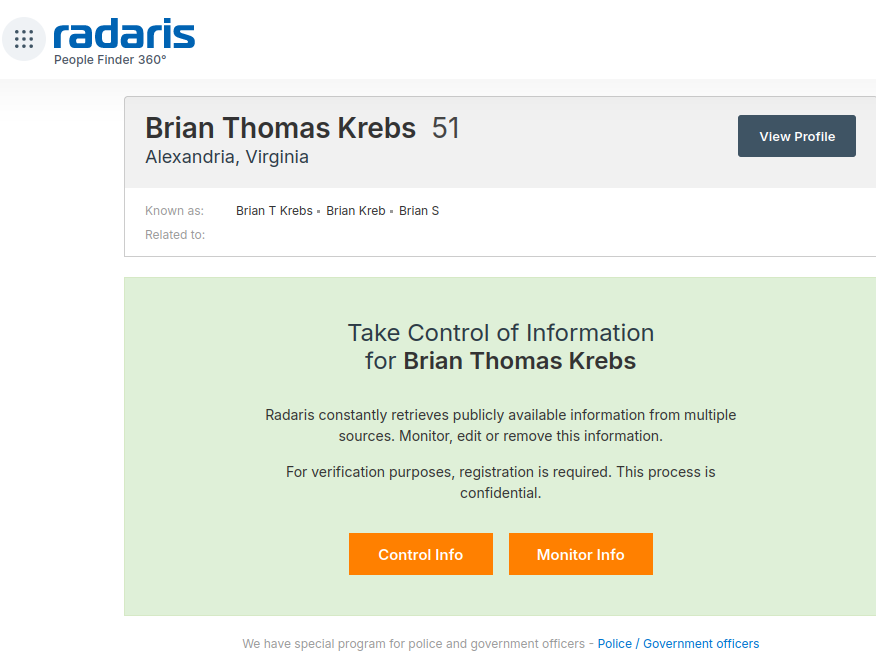
Radaris reports typically bundle a substantial amount of data scraped from public and court documents, including any current or previous addresses and phone numbers, known email addresses and registered domain names. The reports also list address and phone records for the target’s known relatives and associates. Such information could be useful if you were trying to determine the maiden name of someone’s mother, or successfully answer a range of other knowledge-based authentication questions.
Currently, consumer reports advertised for sale at Radaris.com are being fulfilled by a different people-search company called TruthFinder. But Radaris also operates a number of other people-search properties — like Centeda.com — that sell consumer reports directly and behave almost identically to TruthFinder: That is, reel the visitor in with promises of detailed background reports on people, and then charge a $34.99 monthly subscription fee just to view the results.
The Better Business Bureau (BBB) assigns Radaris a rating of “F” for consistently ignoring consumers seeking to have their information removed from Radaris’ various online properties. Of the 159 complaints detailed there in the last year, several were from people who had used third-party identity protection services to have their information removed from Radaris, only to receive a notice a few months later that their Radaris record had been restored.
What’s more, Radaris’ automated process for requesting the removal of your information requires signing up for an account, potentially providing more information about yourself that the company didn’t already have (see screenshot above).
Radaris has not responded to requests for comment.
Radaris, TruthFinder and others like them all force users to agree that their reports will not be used to evaluate someone’s eligibility for credit, or a new apartment or job. This language is so prominent in people-search reports because selling reports for those purposes would classify these firms as consumer reporting agencies (CRAs) and expose them to regulations under the Fair Credit Reporting Act (FCRA).
These data brokers do not want to be treated as CRAs, and for this reason their people search reports typically do not include detailed credit histories, financial information, or full Social Security Numbers (Radaris reports include the first six digits of one’s SSN).
But in September 2023, the U.S. Federal Trade Commission found that TruthFinder and another people-search service Instant Checkmate were trying to have it both ways. The FTC levied a $5.8 million penalty against the companies for allegedly acting as CRAs because they assembled and compiled information on consumers into background reports that were marketed and sold for employment and tenant screening purposes.

An excerpt from the FTC’s complaint against TruthFinder and Instant Checkmate.
The FTC also found TruthFinder and Instant Checkmate deceived users about background report accuracy. The FTC alleges these companies made millions from their monthly subscriptions using push notifications and marketing emails that claimed that the subject of a background report had a criminal or arrest record, when the record was merely a traffic ticket.
“All the while, the companies touted the accuracy of their reports in online ads and other promotional materials, claiming that their reports contain “the MOST ACCURATE information available to the public,” the FTC noted. The FTC says, however, that all the information used in their background reports is obtained from third parties that expressly disclaim that the information is accurate, and that TruthFinder and Instant Checkmate take no steps to verify the accuracy of the information.
The FTC said both companies deceived customers by providing “Remove” and “Flag as Inaccurate” buttons that did not work as advertised. Rather, the “Remove” button removed the disputed information only from the report as displayed to that customer; however, the same item of information remained visible to other customers who searched for the same person.
The FTC also said that when a customer flagged an item in the background report as inaccurate, the companies never took any steps to investigate those claims, to modify the reports, or to flag to other customers that the information had been disputed.
According to Radaris’ profile at the investor website Pitchbook.com, the company’s founder and “co-chief executive officer” is a Massachusetts resident named Gary Norden, also known as Gary Nard.
An analysis of email addresses known to have been used by Mr. Norden shows he is a native Russian man whose real name is Igor Lybarsky (also spelled Lubarsky). Igor’s brother Dmitry, who goes by “Dan,” appears to be the other co-CEO of Radaris. Dmitry Lybarsky’s Facebook/Meta account says he was born in March 1963.

The Lybarsky brothers Dmitry or “Dan” (left) and Igor a.k.a. “Gary,” in an undated photo.
Indirectly or directly, the Lybarskys own multiple properties in both Sherborn and Wellesley, Mass. However, the Radaris website is operated by an offshore entity called Bitseller Expert Ltd, which is incorporated in Cyprus. Neither Lybarsky brother responded to requests for comment.
A review of the domain names registered by Gary Norden shows that beginning in the early 2000s, he and Dan built an e-commerce empire by marketing prepaid calling cards and VOIP services to Russian expatriates who are living in the United States and seeking an affordable way to stay in touch with loved ones back home.
In 2012, the main company in charge of providing those calling services — Wellesley Hills, Mass-based Unipoint Technology Inc. — was fined $179,000 by the U.S. Federal Communications Commission, which said Unipoint never applied for a license to provide international telecommunications services.
DomainTools.com shows the email address gnard@unipointtech.com is tied to 137 domains, including radaris.com. DomainTools also shows that the email addresses used by Gary Norden for more than two decades — epop@comby.com, gary@barksy.com and gary1@eprofit.com, among others — appear in WHOIS registration records for an entire fleet of people-search websites, including: centeda.com, virtory.com, clubset.com, kworld.com, newenglandfacts.com, and pub360.com.
Still more people-search platforms tied to Gary Norden– like publicreports.com and arrestfacts.com — currently funnel interested customers to third-party search companies, such as TruthFinder and PersonTrust.com.
The email addresses used by Gary Nard/Gary Norden are also connected to a slew of data broker websites that sell reports on businesses, real estate holdings, and professionals, including bizstanding.com, homemetry.com, trustoria.com, homeflock.com, rehold.com, difive.com and projectlab.com.
Domain records indicate that Gary and Dan for many years operated a now-defunct pay-per-click affiliate advertising network called affiliate.ru. That entity used domain name servers tied to the aforementioned domains comby.com and eprofit.com, as did radaris.ru.
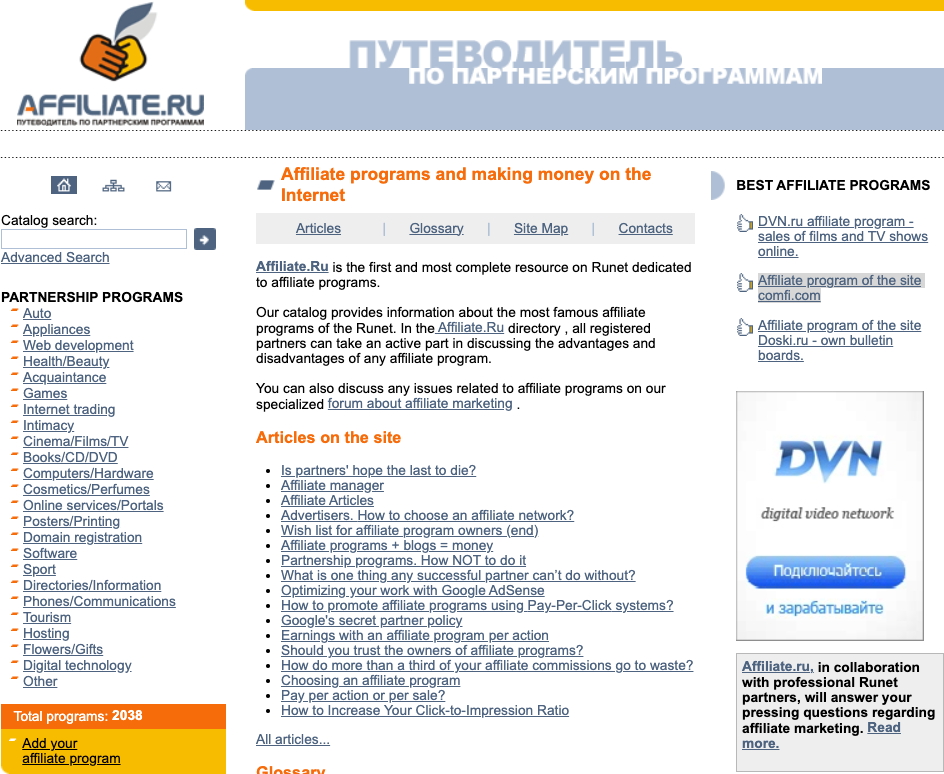
A machine-translated version of Affiliate.ru, a Russian-language site that advertised hundreds of money making affiliate programs, including the Comfi.com prepaid calling card affiliate.
Comby.com used to be a Russian language social media network that looked a great deal like Facebook. The domain now forwards visitors to Privet.ru (“hello” in Russian), a dating site that claims to have 5 million users. Privet.ru says it belongs to a company called Dating Factory, which lists offices in Switzerland. Privet.ru uses the Gary Norden domain eprofit.com for its domain name servers.
Dating Factory’s website says it sells “powerful dating technology” to help customers create unique or niche dating websites. A review of the sample images available on the Dating Factory homepage suggests the term “dating” in this context refers to adult websites. Dating Factory also operates a community called FacebookOfSex, as well as the domain analslappers.com.
Email addresses for the Comby and Eprofit domains indicate Gary Norden operates an entity in Wellesley Hills, Mass. called RussianAmerican Holding Inc. (russianamerica.com). This organization is listed as the owner of the domain newyork.ru, which is a site dedicated to orienting newcomers from Russia to the Big Apple.
Newyork.ru’s terms of service refer to an international calling card company called ComFi Inc. (comfi.com) and list an address as PO Box 81362 Wellesley Hills, Ma. Other sites that include this address are russianamerica.com, russianboston.com, russianchicago.com, russianla.com, russiansanfran.com, russianmiami.com, russiancleveland.com and russianseattle.com (currently offline).
ComFi is tied to Comfibook.com, which was a search aggregator website that collected and published data from many online and offline sources, including phone directories, social networks, online photo albums, and public records.
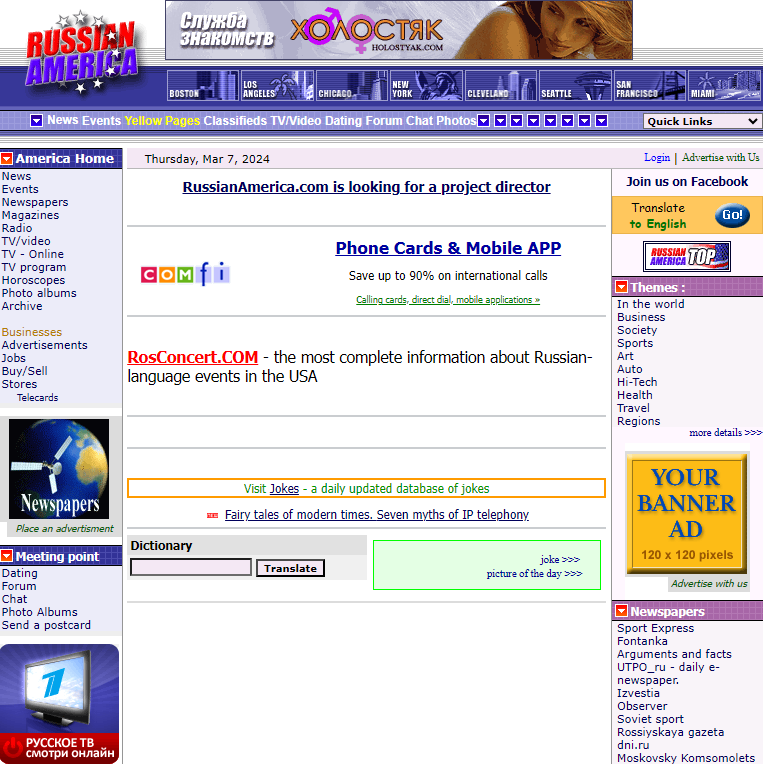
The current website for russianamerica.com. Note the ad in the bottom left corner of this image for Channel One, a Russian state-owned media firm that is currently sanctioned by the U.S. government.
Many of the U.S. city-specific online properties apparently tied to Gary Norden include phone numbers on their contact pages for a pair of Russian media and advertising firms based in southern California. The phone number 323-874-8211 appears on the websites russianla.com, russiasanfran.com, and rosconcert.com, which sells tickets to theater events performed in Russian.
Historic domain registration records from DomainTools show rosconcert.com was registered in 2003 to Unipoint Technologies — the same company fined by the FCC for not having a license. Rosconcert.com also lists the phone number 818-377-2101.
A phone number just a few digits away — 323-874-8205 — appears as a point of contact on newyork.ru, russianmiami.com, russiancleveland.com, and russianchicago.com. A search in Google shows this 82xx number range — and the 818-377-2101 number — belong to two different entities at the same UPS Store mailbox in Tarzana, Calif: American Russian Media Inc. (armediacorp.com), and Lamedia.biz.
Armediacorp.com is the home of FACT Magazine, a glossy Russian-language publication put out jointly by the American-Russian Business Council, the Hollywood Chamber of Commerce, and the West Hollywood Chamber of Commerce.
Lamedia.biz says it is an international media organization with more than 25 years of experience within the Russian-speaking community on the West Coast. The site advertises FACT Magazine and the Russian state-owned media outlet Channel One. Clicking the Channel One link on the homepage shows Lamedia.biz offers to submit advertising spots that can be shown to Channel One viewers. The price for a basic ad is listed at $500.
In May 2022, the U.S. government levied financial sanctions against Channel One that bar US companies or citizens from doing business with the company.

The website of lamedia.biz offers to sell advertising on two Russian state-owned media firms currently sanctioned by the U.S. government.
In 2014, a group of people sued Radaris in a class-action lawsuit claiming the company’s practices violated the Fair Credit Reporting Act. Court records indicate the defendants never showed up in court to dispute the claims, and as a result the judge eventually awarded the plaintiffs a default judgement and ordered the company to pay $7.5 million.
But the plaintiffs in that civil case had a difficult time collecting on the court’s ruling. In response, the court ordered the radaris.com domain name (~9.4M monthly visitors) to be handed over to the plaintiffs.
However, in 2018 Radaris was able to reclaim their domain on a technicality. Attorneys for the company argued that their clients were never named as defendants in the original lawsuit, and so their domain could not legally be taken away from them in a civil judgment.
“Because our clients were never named as parties to the litigation, and were never served in the litigation, the taking of their property without due process is a violation of their rights,” Radaris’ attorneys argued.
In October 2023, an Illinois resident filed a class-action lawsuit against Radaris for allegedly using people’s names for commercial purposes, in violation of the Illinois Right of Publicity Act.
On Feb. 8, 2024, a company called Atlas Data Privacy Corp. sued Radaris LLC for allegedly violating “Daniel’s Law,” a statute that allows New Jersey law enforcement, government personnel, judges and their families to have their information completely removed from people-search services and commercial data brokers. Atlas has filed at least 140 similar Daniel’s Law complaints against data brokers recently.
Daniel’s Law was enacted in response to the death of 20-year-old Daniel Anderl, who was killed in a violent attack targeting a federal judge (his mother). In July 2020, a disgruntled attorney who had appeared before U.S. District Judge Esther Salas disguised himself as a Fedex driver, went to her home and shot and killed her son (the judge was unharmed and the assailant killed himself).
Earlier this month, The Record reported on Atlas Data Privacy’s lawsuit against LexisNexis Risk Data Management, in which the plaintiffs representing thousands of law enforcement personnel in New Jersey alleged that after they asked for their information to remain private, the data broker retaliated against them by freezing their credit and falsely reporting them as identity theft victims.
Another data broker sued by Atlas Data Privacy — pogodata.com — announced on Mar. 1 that it was likely shutting down because of the lawsuit.
“The matter is far from resolved but your response motivates us to try to bring back most of the names while preserving redaction of the 17,000 or so clients of the redaction company,” the company wrote. “While little consolation, we are not alone in the suit – the privacy company sued 140 property-data sites at the same time as PogoData.”
Atlas says their goal is convince more states to pass similar laws, and to extend those protections to other groups such as teachers, healthcare personnel and social workers. Meanwhile, media law experts say they’re concerned that enacting Daniel’s Law in other states would limit the ability of journalists to hold public officials accountable, and allow authorities to pursue criminals charges against media outlets that publish the same type of public and governments records that fuel the people-search industry.
There are some pending changes to the US legal and regulatory landscape that could soon reshape large swaths of the data broker industry. But experts say it is unlikely that any of these changes will affect people-search companies like Radaris.
On Feb. 28, 2024, the White House issued an executive order that directs the U.S. Department of Justice (DOJ) to create regulations that would prevent data brokers from selling or transferring abroad certain data types deemed too sensitive, including genomic and biometric data, geolocation and financial data, as well as other as-yet unspecified personal identifiers. The DOJ this week published a list of more than 100 questions it is seeking answers to regarding the data broker industry.
In August 2023, the Consumer Financial Protection Bureau (CFPB) announced it was undertaking new rulemaking related to data brokers.
Justin Sherman, an adjunct professor at Duke University, said neither the CFPB nor White House rulemaking will likely address people-search brokers because these companies typically get their information by scouring federal, state and local government records. Those government files include voting registries, property filings, marriage certificates, motor vehicle records, criminal records, court documents, death records, professional licenses, bankruptcy filings, and more.
“These dossiers contain everything from individuals’ names, addresses, and family information to data about finances, criminal justice system history, and home and vehicle purchases,” Sherman wrote in an October 2023 article for Lawfare. “People search websites’ business pitch boils down to the fact that they have done the work of compiling data, digitizing it, and linking it to specific people so that it can be searched online.”
Sherman said while there are ongoing debates about whether people search data brokers have legal responsibilities to the people about whom they gather and sell data, the sources of this information — public records — are completely carved out from every single state consumer privacy law.
“Consumer privacy laws in California, Colorado, Connecticut, Delaware, Indiana, Iowa, Montana, Oregon, Tennessee, Texas, Utah, and Virginia all contain highly similar or completely identical carve-outs for ‘publicly available information’ or government records,” Sherman wrote. “Tennessee’s consumer data privacy law, for example, stipulates that “personal information,” a cornerstone of the legislation, does not include ‘publicly available information,’ defined as:
“…information that is lawfully made available through federal, state, or local government records, or information that a business has a reasonable basis to believe is lawfully made available to the general public through widely distributed media, by the consumer, or by a person to whom the consumer has disclosed the information, unless the consumer has restricted the information to a specific audience.”
Sherman said this is the same language as the carve-out in the California privacy regime, which is often held up as the national leader in state privacy regulations. He said with a limited set of exceptions for survivors of stalking and domestic violence, even under California’s newly passed Delete Act — which creates a centralized mechanism for consumers to ask some third-party data brokers to delete their information — consumers across the board cannot exercise these rights when it comes to data scraped from property filings, marriage certificates, and public court documents, for example.
“With some very narrow exceptions, it’s either extremely difficult or impossible to compel these companies to remove your information from their sites,” Sherman told KrebsOnSecurity. “Even in states like California, every single consumer privacy law in the country completely exempts publicly available information.”
Below is a mind map that helped KrebsOnSecurity track relationships between and among the various organizations named in the story above:
A new data leak that appears to have come from one of China’s top private cybersecurity firms provides a rare glimpse into the commercial side of China’s many state-sponsored hacking groups. Experts say the leak illustrates how Chinese government agencies increasingly are contracting out foreign espionage campaigns to the nation’s burgeoning and highly competitive cybersecurity industry.
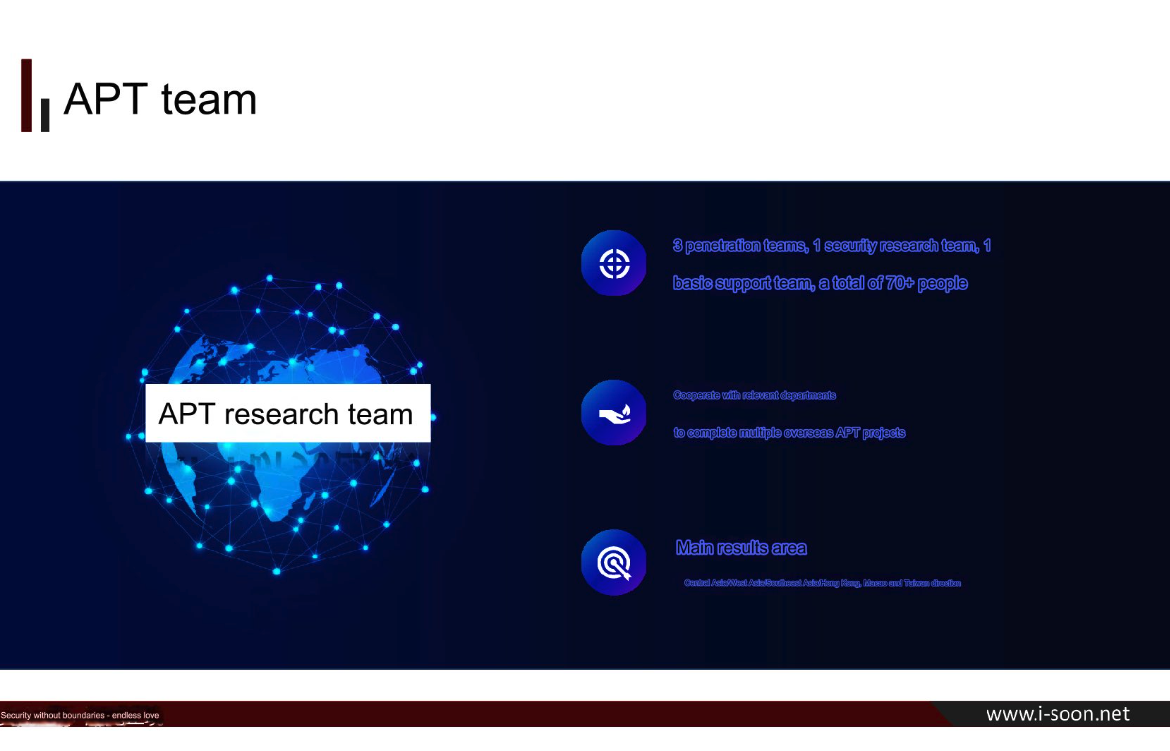
A marketing slide deck promoting i-SOON’s Advanced Persistent Threat (APT) capabilities.
A large cache of more than 500 documents published to GitHub last week indicate the records come from i-SOON, a technology company headquartered in Shanghai that is perhaps best known for providing cybersecurity training courses throughout China. But the leaked documents, which include candid employee chat conversations and images, show a less public side of i-SOON, one that frequently initiates and sustains cyberespionage campaigns commissioned by various Chinese government agencies.
The leaked documents suggest i-SOON employees were responsible for a raft of cyber intrusions over many years, infiltrating government systems in the United Kingdom and countries throughout Asia. Although the cache does not include raw data stolen from cyber espionage targets, it features numerous documents listing the level of access gained and the types of data exposed in each intrusion.
Security experts who reviewed the leaked data say they believe the information is legitimate, and that i-SOON works closely with China’s Ministry of Public Security and the military. In 2021, the Sichuan provincial government named i-SOON as one of “the top 30 information security companies.”
“The leak provides some of the most concrete details seen publicly to date, revealing the maturing nature of China’s cyber espionage ecosystem,” said Dakota Cary, a China-focused consultant at the security firm SentinelOne. “It shows explicitly how government targeting requirements drive a competitive marketplace of independent contractor hackers-for-hire.”
Mei Danowski is a former intelligence analyst and China expert who now writes about her research in a Substack publication called Natto Thoughts. Danowski said i-SOON has achieved the highest secrecy classification that a non-state-owned company can receive, which qualifies the company to conduct classified research and development related to state security.
i-SOON’s “business services” webpage states that the company’s offerings include public security, anti-fraud, blockchain forensics, enterprise security solutions, and training. Danowski said that in 2013, i-SOON established a department for research on developing new APT network penetration methods.
APT stands for Advanced Persistent Threat, a term that generally refers to state-sponsored hacking groups. Indeed, among the documents apparently leaked from i-SOON is a sales pitch slide boldly highlighting the hacking prowess of the company’s “APT research team” (see screenshot above).

i-SOON CEO Wu Haibo, in 2011. Image: nattothoughts.substack.com.
The leaked documents included a lengthy chat conversation between the company’s founders, who repeatedly discuss flagging sales and the need to secure more employees and government contracts. Danowski said the CEO of i-SOON, Wu Haibo (“Shutdown” in the leaked chats) is a well-known first-generation red hacker or “Honker,” and an early member of Green Army — the very first Chinese hacktivist group founded in 1997. Mr. Haibo has not yet responded to a request for comment.
In October 2023, Danowski detailed how i-SOON became embroiled in a software development contract dispute when it was sued by a competing Chinese cybersecurity company called Chengdu 404. In September 2020, the U.S. Department of Justice unsealed indictments against multiple Chengdu 404 employees, charging that the company was a facade that hid more than a decade’s worth of cyber intrusions attributed to a threat actor group known as “APT 41.”
Danowski said the existence of this legal dispute suggests that Chengdu 404 and i-SOON have or at one time had a business relationship, and that one company likely served as a subcontractor to the other.
“From what they chat about we can see this is a very competitive industry, where companies in this space are constantly poaching each others’ employees and tools,” Danowski said. “The infosec industry is always trying to distinguish [the work] of one APT group from another. But that’s getting harder to do.”
It remains unclear if i-SOON’s work has earned it a unique APT designation. But Will Thomas, a cyber threat intelligence researcher at Equinix, found an Internet address in the leaked data that corresponds to a domain flagged in a 2019 Citizen Lab report about one-click mobile phone exploits that were being used to target groups in Tibet. The 2019 report referred to the threat actor behind those attacks as an APT group called Poison Carp.
Several images and chat records in the data leak suggest i-SOON’s clients periodically gave the company a list of targets they wanted to infiltrate, but sometimes employees confused the instructions. One screenshot shows a conversation in which an employee tells his boss they’ve just hacked one of the universities on their latest list, only to be told that the victim in question was not actually listed as a desired target.
The leaked chats show i-SOON continuously tried to recruit new talent by hosting a series of hacking competitions across China. It also performed charity work, and sought to engage employees and sustain morale with various team-building events.
However, the chats include multiple conversations between employees commiserating over long hours and low pay. The overall tone of the discussions indicates employee morale was quite low and that the workplace environment was fairly toxic. In several of the conversations, i-SOON employees openly discuss with their bosses how much money they just lost gambling online with their mobile phones while at work.
Danowski believes the i-SOON data was probably leaked by one of those disgruntled employees.
“This was released the first working day after the Chinese New Year,” Danowski said. “Definitely whoever did this planned it, because you can’t get all this information all at once.”
SentinelOne’s Cary said he came to the same conclusion, noting that the Protonmail account tied to the GitHub profile that published the records was registered a month before the leak, on January 15, 2024.
China’s much vaunted Great Firewall not only lets the government control and limit what citizens can access online, but this distributed spying apparatus allows authorities to block data on Chinese citizens and companies from ever leaving the country.
As a result, China enjoys a remarkable information asymmetry vis-a-vis virtually all other industrialized nations. Which is why this apparent data leak from i-SOON is such a rare find for Western security researchers.
“I was so excited to see this,” Cary said. “Every day I hope for data leaks coming out of China.”
That information asymmetry is at the heart of the Chinese government’s cyberwarfare goals, according to a 2023 analysis by Margin Research performed on behalf of the Defense Advanced Research Projects Agency (DARPA).
“In the area of cyberwarfare, the western governments see cyberspace as a ‘fifth domain’ of warfare,” the Margin study observed. “The Chinese, however, look at cyberspace in the broader context of information space. The ultimate objective is, not ‘control’ of cyberspace, but control of information, a vision that dominates China’s cyber operations.”
The National Cybersecurity Strategy issued by the White House last year singles out China as the biggest cyber threat to U.S. interests. While the United States government does contract certain aspects of its cyber operations to companies in the private sector, it does not follow China’s example in promoting the wholesale theft of state and corporate secrets for the commercial benefit of its own private industries.
Dave Aitel, a co-author of the Margin Research report and former computer scientist at the U.S. National Security Agency, said it’s nice to see that Chinese cybersecurity firms have to deal with all of the same contracting headaches facing U.S. companies seeking work with the federal government.
“This leak just shows there’s layers of contractors all the way down,” Aitel said. “It’s pretty fun to see the Chinese version of it.”
U.S. and U.K. authorities have seized the darknet websites run by LockBit, a prolific and destructive ransomware group that has claimed more than 2,000 victims worldwide and extorted over $120 million in payments. Instead of listing data stolen from ransomware victims who didn’t pay, LockBit’s victim shaming website now offers free recovery tools, as well as news about arrests and criminal charges involving LockBit affiliates.
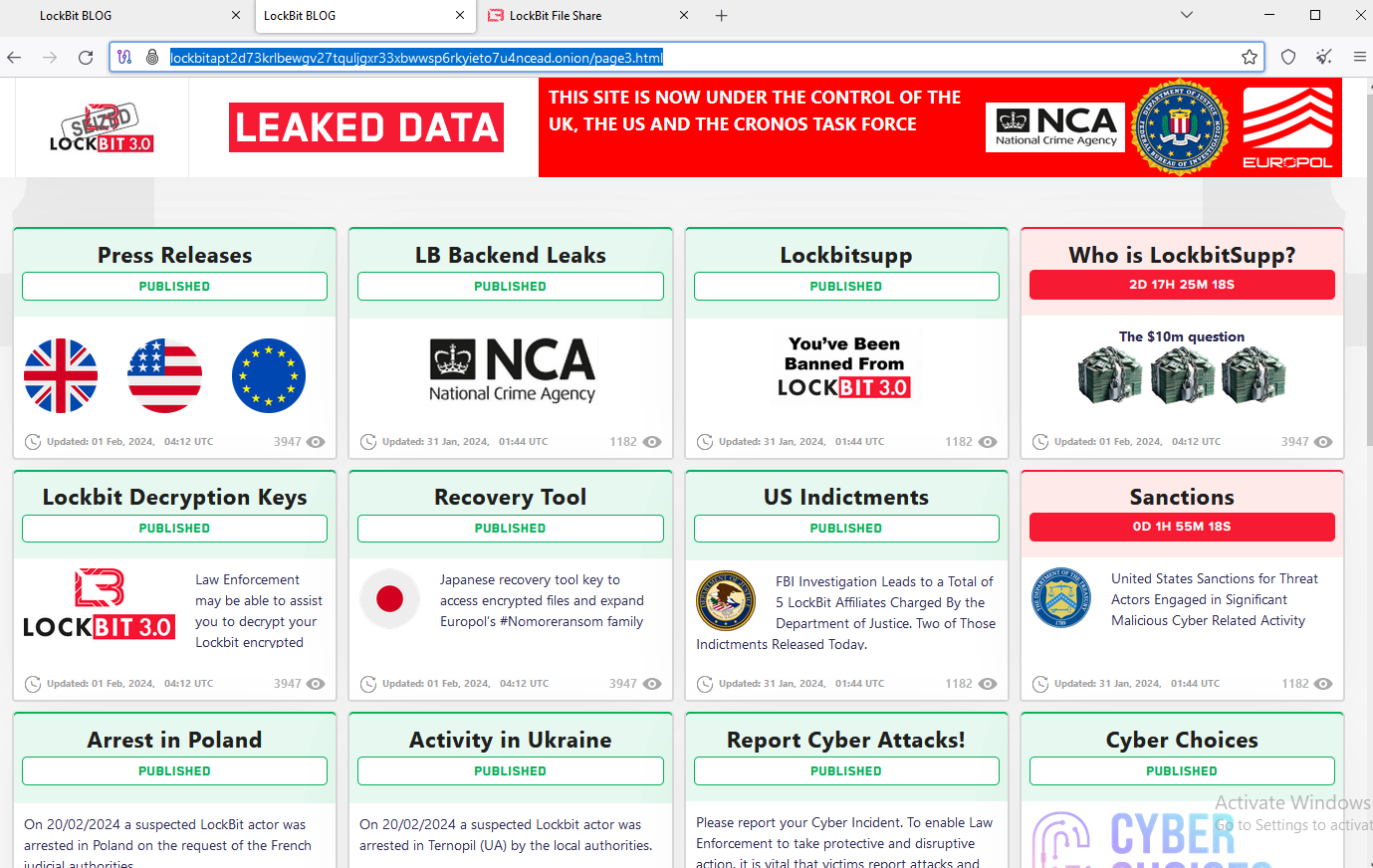
Investigators used the existing design on LockBit’s victim shaming website to feature press releases and free decryption tools.
Dubbed “Operation Cronos,” the law enforcement action involved the seizure of nearly three-dozen servers; the arrest of two alleged LockBit members; the unsealing of two indictments; the release of a free LockBit decryption tool; and the freezing of more than 200 cryptocurrency accounts thought to be tied to the gang’s activities.
LockBit members have executed attacks against thousands of victims in the United States and around the world, according to the U.S. Department of Justice (DOJ). First surfacing in September 2019, the gang is estimated to have made hundreds of millions of U.S. dollars in ransom demands, and extorted over $120 million in ransom payments.
LockBit operated as a ransomware-as-a-service group, wherein the ransomware gang takes care of everything from the bulletproof hosting and domains to the development and maintenance of the malware. Meanwhile, affiliates are solely responsible for finding new victims, and can reap 60 to 80 percent of any ransom amount ultimately paid to the group.
A statement on Operation Cronos from the European police agency Europol said the months-long infiltration resulted in the compromise of LockBit’s primary platform and other critical infrastructure, including the takedown of 34 servers in the Netherlands, Germany, Finland, France, Switzerland, Australia, the United States and the United Kingdom. Europol said two suspected LockBit actors were arrested in Poland and Ukraine, but no further information has been released about those detained.
The DOJ today unsealed indictments against two Russian men alleged to be active members of LockBit. The government says Russian national Artur Sungatov used LockBit ransomware against victims in manufacturing, logistics, insurance and other companies throughout the United States.
Ivan Gennadievich Kondratyev, a.k.a. “Bassterlord,” allegedly deployed LockBit against targets in the United States, Singapore, Taiwan, and Lebanon. Kondratyev is also charged (PDF) with three criminal counts arising from his alleged use of the Sodinokibi (aka “REvil“) ransomware variant to encrypt data, exfiltrate victim information, and extort a ransom payment from a corporate victim based in Alameda County, California.
With the indictments of Sungatov and Kondratyev, a total of five LockBit affiliates now have been officially charged. In May 2023, U.S. authorities unsealed indictments against two alleged LockBit affiliates, Mikhail “Wazawaka” Matveev and Mikhail Vasiliev.
Vasiliev, 35, of Bradford, Ontario, Canada, is in custody in Canada awaiting extradition to the United States (the complaint against Vasiliev is at this PDF). Matveev remains at large, presumably still in Russia. In January 2022, KrebsOnSecurity published Who is the Network Access Broker ‘Wazawaka,’ which followed clues from Wazawaka’s many pseudonyms and contact details on the Russian-language cybercrime forums back to a 31-year-old Mikhail Matveev from Abaza, RU.

An FBI wanted poster for Matveev.
In June 2023, Russian national Ruslan Magomedovich Astamirov was charged in New Jersey for his participation in the LockBit conspiracy, including the deployment of LockBit against victims in Florida, Japan, France, and Kenya. Astamirov is currently in custody in the United States awaiting trial.
LockBit was known to have recruited affiliates that worked with multiple ransomware groups simultaneously, and it’s unclear what impact this takedown may have on competing ransomware affiliate operations. The security firm ProDaft said on Twitter/X that the infiltration of LockBit by investigators provided “in-depth visibility into each affiliate’s structures, including ties with other notorious groups such as FIN7, Wizard Spider, and EvilCorp.”
In a lengthy thread about the LockBit takedown on the Russian-language cybercrime forum XSS, one of the gang’s leaders said the FBI and the U.K.’s National Crime Agency (NCA) had infiltrated its servers using a known vulnerability in PHP, a scripting language that is widely used in Web development.
Several denizens of XSS wondered aloud why the PHP flaw was not flagged by LockBit’s vaunted “Bug Bounty” program, which promised a financial reward to affiliates who could find and quietly report any security vulnerabilities threatening to undermine LockBit’s online infrastructure.
This prompted several XSS members to start posting memes taunting the group about the security failure.
“Does it mean that the FBI provided a pentesting service to the affiliate program?,” one denizen quipped. “Or did they decide to take part in the bug bounty program? :):)”
Federal investigators also appear to be trolling LockBit members with their seizure notices. LockBit’s data leak site previously featured a countdown timer for each victim organization listed, indicating the time remaining for the victim to pay a ransom demand before their stolen files would be published online. Now, the top entry on the shaming site is a countdown timer until the public doxing of “LockBitSupp,” the unofficial spokesperson or figurehead for the LockBit gang.
“Who is LockbitSupp?” the teaser reads. “The $10m question.”
In January 2024, LockBitSupp told XSS forum members he was disappointed the FBI hadn’t offered a reward for his doxing and/or arrest, and that in response he was placing a bounty on his own head — offering $10 million to anyone who could discover his real name.
“My god, who needs me?,” LockBitSupp wrote on Jan. 22, 2024. “There is not even a reward out for me on the FBI website. By the way, I want to use this chance to increase the reward amount for a person who can tell me my full name from USD 1 million to USD 10 million. The person who will find out my name, tell it to me and explain how they were able to find it out will get USD 10 million. Please take note that when looking for criminals, the FBI uses unclear wording offering a reward of UP TO USD 10 million; this means that the FBI can pay you USD 100, because technically, it’s an amount UP TO 10 million. On the other hand, I am willing to pay USD 10 million, no more and no less.”
Mark Stockley, cybersecurity evangelist at the security firm Malwarebytes, said the NCA is obviously trolling the LockBit group and LockBitSupp.
“I don’t think this is an accident—this is how ransomware groups talk to each other,” Stockley said. “This is law enforcement taking the time to enjoy its moment, and humiliate LockBit in its own vernacular, presumably so it loses face.”
In a press conference today, the FBI said Operation Cronos included investigative assistance from the Gendarmerie-C3N in France; the State Criminal Police Office L-K-A and Federal Criminal Police Office in Germany; Fedpol and Zurich Cantonal Police in Switzerland; the National Police Agency in Japan; the Australian Federal Police; the Swedish Police Authority; the National Bureau of Investigation in Finland; the Royal Canadian Mounted Police; and the National Police in the Netherlands.
The Justice Department said victims targeted by LockBit should contact the FBI at https://lockbitvictims.ic3.gov/ to determine whether affected systems can be successfully decrypted. In addition, the Japanese Police, supported by Europol, have released a recovery tool designed to recover files encrypted by the LockBit 3.0 Black Ransomware.

Today, the latest issue of The Domain Name Industry Brief Quarterly Report was released by DNIB.com, showing the fourth quarter of 2023 closed with 359.8 million domain name registrations across all top-level domains (TLDs), an increase of 0.6 million domain name registrations, or 0.2%, compared to the third quarter of 2023. Domain name registrations also increased by 8.9 million, or 2.5%, year over year.
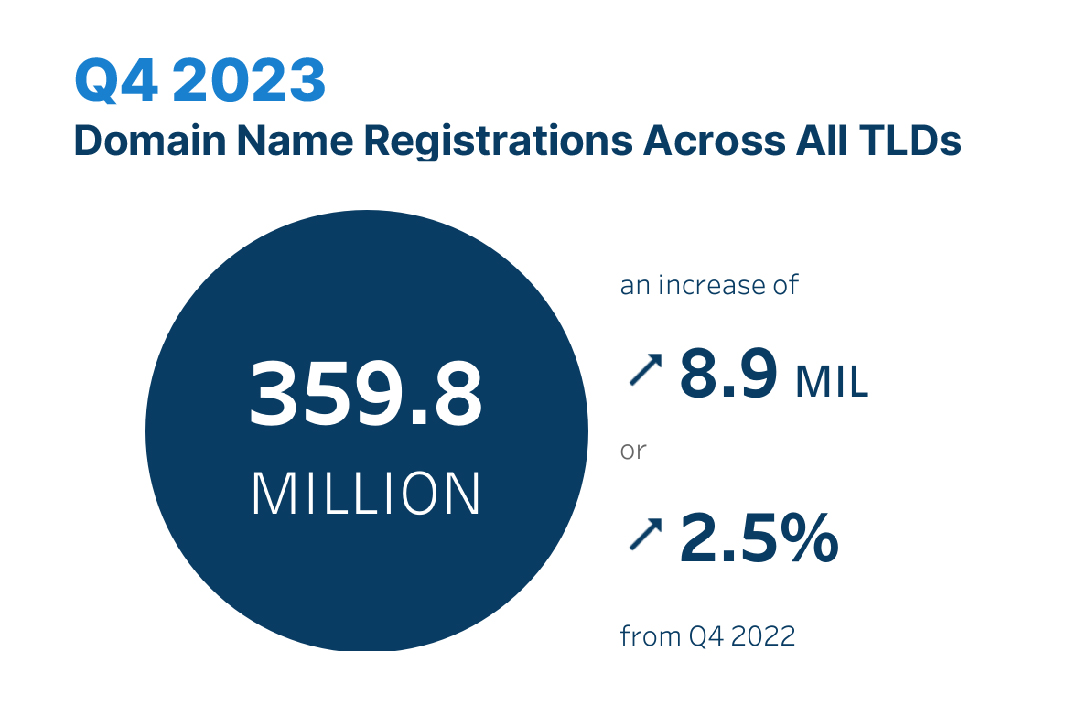
Check out the latest issue of The Domain Name Industry Brief Quarterly Report to see domain name stats from the fourth quarter of 2023, including:
DNIB.com and The Domain Name Industry Brief Quarterly Report are sponsored by Verisign. To see past issues of the quarterly report, interactive dashboards and learn about DNIB.com’s statistical methodology, please visit DNIB.com.
The post Domain Name Industry Brief Quarterly Report: DNIB.com Announces 359.8 Million Domain Name Registrations in the Fourth Quarter of 2023 appeared first on Verisign Blog.
In 2021, the exclusive Russian cybercrime forum Mazafaka was hacked. The leaked user database shows one of the forum’s founders was an attorney who advised Russia’s top hackers on the legal risks of their work, and what to do if they got caught. A review of this user’s hacker identities shows that during his time on the forums he served as an officer in the special forces of the GRU, the foreign military intelligence agency of the Russian Federation.
Launched in 2001 under the tagline “Network terrorism,” Mazafaka would evolve into one of the most guarded Russian-language cybercrime communities. The forum’s member roster included a Who’s Who of top Russian cybercriminals, and it featured sub-forums for a wide range of cybercrime specialities, including malware, spam, coding and identity theft.
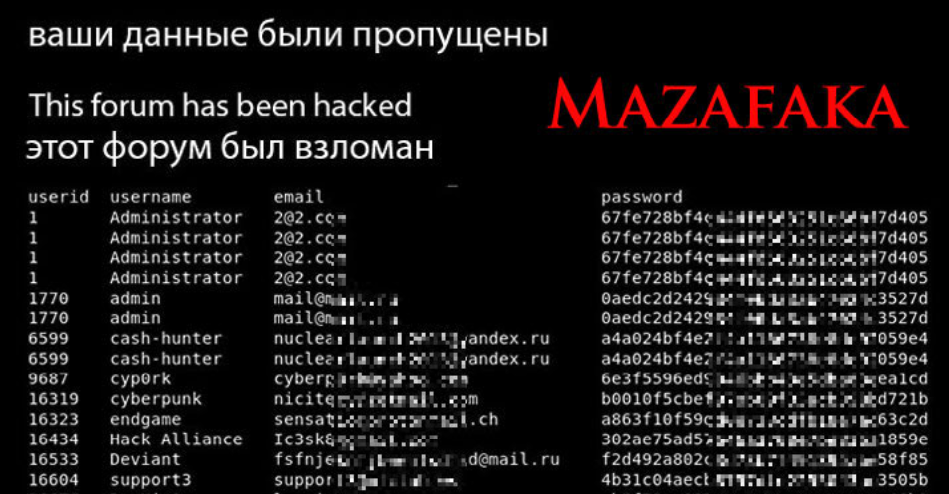
One representation of the leaked Mazafaka database.
In almost any database leak, the first accounts listed are usually the administrators and early core members. But the Mazafaka user information posted online was not a database file per se, and it was clearly edited, redacted and restructured by whoever released it. As a result, it can be difficult to tell which members are the earliest users.
The original Mazafaka is known to have been launched by a hacker using the nickname “Stalker.” However, the lowest numbered (non-admin) user ID in the Mazafaka database belongs to another individual who used the handle “Djamix,” and the email address djamix@mazafaka[.]ru.
From the forum’s inception until around 2008, Djamix was one of its most active and eloquent contributors. Djamix told forum members he was a lawyer, and nearly all of his posts included legal analyses of various public cases involving hackers arrested and charged with cybercrimes in Russia and abroad.
“Hiding with purely technical parameters will not help in a serious matter,” Djamix advised Maza members in September 2007. “In order to ESCAPE the law, you need to KNOW the law. This is the most important thing. Technical capabilities cannot overcome intelligence and cunning.”
Stalker himself credited Djamix with keeping Mazafaka online for so many years. In a retrospective post published to Livejournal in 2014 titled, “Mazafaka, from conception to the present day,” Stalker said Djamix had become a core member of the community.
“This guy is everywhere,” Stalker said of Djamix. “There’s not a thing on [Mazafaka] that he doesn’t take part in. For me, he is a stimulus-irritant and thanks to him, Maza is still alive. Our rallying force!”
Djamix told other forum denizens he was a licensed attorney who could be hired for remote or in-person consultations, and his posts on Mazafaka and other Russian boards show several hackers facing legal jeopardy likely took him up on this offer.
“I have the right to represent your interests in court,” Djamix said on the Russian-language cybercrime forum Verified in Jan. 2011. “Remotely (in the form of constant support and consultations), or in person – this is discussed separately. As well as the cost of my services.”
A search on djamix@mazafaka[.]ru at DomainTools.com reveals this address has been used to register at least 10 domain names since 2008. Those include several websites about life in and around Sochi, Russia, the site of the 2014 Winter Olympics, as well as a nearby coastal town called Adler. All of those sites say they were registered to an Aleksei Safronov from Sochi who also lists Adler as a hometown.
The breach tracking service Constella Intelligence finds that the phone number associated with those domains — +7.9676442212 — is tied to a Facebook account for an Aleksei Valerievich Safronov from Sochi. Mr. Safronov’s Facebook profile, which was last updated in October 2022, says his ICQ instant messenger number is 53765. This is the same ICQ number assigned to Djamix in the Mazafaka user database.

The Facebook account for Aleksey Safronov.
A “Djamix” account on the forum privetsochi[.]ru (“Hello Sochi”) says this user was born Oct. 2, 1970, and that his website is uposter[.]ru. This Russian language news site’s tagline is, “We Create Communication,” and it focuses heavily on news about Sochi, Adler, Russia and the war in Ukraine, with a strong pro-Kremlin bent.
Safronov’s Facebook profile also gives his Skype username as “Djamixadler,” and it includes dozens of photos of him dressed in military fatigues along with a regiment of soldiers deploying in fairly remote areas of Russia. Some of those photos date back to 2008.
In several of the images, we can see a patch on the arm of Safronov’s jacket that bears the logo of the Spetsnaz GRU, a special forces unit of the Russian military. According to a 2020 report from the Congressional Research Service, the GRU operates both as an intelligence agency — collecting human, cyber, and signals intelligence — and as a military organization responsible for battlefield reconnaissance and the operation of Russia’s Spetsnaz military commando units.

Mr. Safronov posted this image of himself on Facebook in 2016. The insignia of the GRU can be seen on his sleeve.
“In recent years, reports have linked the GRU to some of Russia’s most aggressive and public intelligence operations,” the CRS report explains. “Reportedly, the GRU played a key role in Russia’s occupation of Ukraine’s Crimea region and invasion of eastern Ukraine, the attempted assassination of former Russian intelligence officer Sergei Skripal in the United Kingdom, interference in the 2016 U.S. presidential elections, disinformation and propaganda operations, and some of the world’s most damaging cyberattacks.”
According to the Russia-focused investigative news outlet Meduza, in 2014 the Russian Defense Ministry created its “information-operation troops” for action in “cyber-confrontations with potential adversaries.”
“Later, sources in the Defense Ministry explained that these new troops were meant to ‘disrupt the potential adversary’s information networks,'” Meduza reported in 2018. “Recruiters reportedly went looking for ‘hackers who have had problems with the law.'”
Mr. Safronov did not respond to multiple requests for comment. A 2018 treatise written by Aleksei Valerievich Safronov titled “One Hundred Years of GRU Military Intelligence” explains the significance of the bat in the seal of the GRU.
“One way or another, the bat is an emblem that unites all active and retired intelligence officers; it is a symbol of unity and exclusivity,” Safronov wrote. “And, in general, it doesn’t matter who we’re talking about – a secret GRU agent somewhere in the army or a sniper in any of the special forces brigades. They all did and are doing one very important and responsible thing.”
It’s unclear what role Mr. Safronov plays or played in the GRU, but it seems likely the military intelligence agency would have exploited his considerable technical skills, knowledge and connections on the Russian cybercrime forums.
Searching on Safronov’s domain uposter[.]ru in Constella Intelligence reveals that this domain was used in 2022 to register an account at a popular Spanish-language discussion forum dedicated to helping applicants prepare for a career in the Guardia Civil, one of Spain’s two national police forces. Pivoting on that Russian IP in Constella shows three other accounts were created at the same Spanish user forum around the same date.
Mark Rasch is a former cybercrime prosecutor for the U.S. Department of Justice who now serves as chief legal officer for the New York cybersecurity firm Unit 221B. Rasch said there has always been a close relationship between the GRU and the Russian hacker community, noting that in the early 2000s the GRU was soliciting hackers with the skills necessary to hack US banks in order to procure funds to help finance Russia’s war in Chechnya.
“The guy is heavily hooked into the Russian cyber community, and that’s useful for intelligence services,” Rasch said. “He could have been infiltrating the community to monitor it for the GRU. Or he could just be a guy wearing a military uniform.”
On Jan. 9, 2024, U.S. authorities arrested a 19-year-old Florida man charged with wire fraud, aggravated identity theft, and conspiring with others to use SIM-swapping to steal cryptocurrency. Sources close to the investigation tell KrebsOnSecurity the accused was a key member of a criminal hacking group blamed for a string of cyber intrusions at major U.S. technology companies during the summer of 2022.
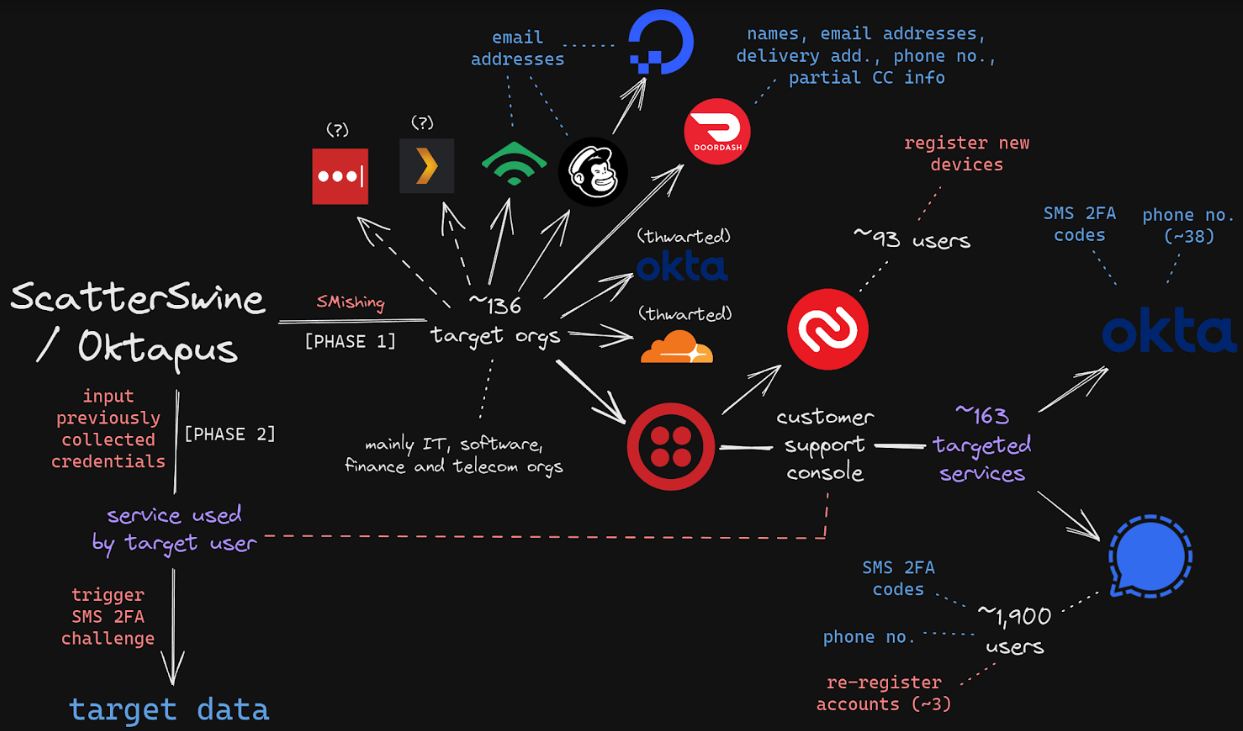
A graphic depicting how 0ktapus leveraged one victim to attack another. Image credit: Amitai Cohen of Wiz.
Prosecutors say Noah Michael Urban of Palm Coast, Fla., stole at least $800,000 from at least five victims between August 2022 and March 2023. In each attack, the victims saw their email and financial accounts compromised after suffering an unauthorized SIM-swap, wherein attackers transferred each victim’s mobile phone number to a new device that they controlled.
The government says Urban went by the aliases “Sosa” and “King Bob,” among others. Multiple trusted sources told KrebsOnSecurity that Sosa/King Bob was a core member of a hacking group behind the 2022 breach at Twilio, a company that provides services for making and receiving text messages and phone calls. Twilio disclosed in Aug. 2022 that an intrusion had exposed a “limited number” of Twilio customer accounts through a sophisticated social engineering attack designed to steal employee credentials.
Shortly after that disclosure, the security firm Group-IB published a report linking the attackers behind the Twilio intrusion to separate breaches at more than 130 organizations, including LastPass, DoorDash, Mailchimp, and Plex. Multiple security firms soon assigned the hacking group the nickname “Scattered Spider.”
Group-IB dubbed the gang by a different name — 0ktapus — which was a nod to how the criminal group phished employees for credentials. The missives asked users to click a link and log in at a phishing page that mimicked their employer’s Okta authentication page. Those who submitted credentials were then prompted to provide the one-time password needed for multi-factor authentication.

A booking photo of Noah Michael Urban released by the Volusia County Sheriff.
0ktapus used newly-registered domains that often included the name of the targeted company, and sent text messages urging employees to click on links to these domains to view information about a pending change in their work schedule. The phishing sites used a Telegram instant message bot to forward any submitted credentials in real-time, allowing the attackers to use the phished username, password and one-time code to log in as that employee at the real employer website.
0ktapus often leveraged information or access gained in one breach to perpetrate another. As documented by Group-IB, the group pivoted from its access to Twilio to attack at least 163 of its customers. Among those was the encrypted messaging app Signal, which said the breach could have let attackers re-register the phone number on another device for about 1,900 users.
Also in August 2022, several employees at email delivery firm Mailchimp provided their remote access credentials to this phishing group. According to an Aug. 12 blog post, the attackers used their access to Mailchimp employee accounts to steal data from 214 customers involved in cryptocurrency and finance.
On August 25, 2022, the password manager service LastPass disclosed a breach in which attackers stole some source code and proprietary LastPass technical information, and weeks later LastPass said an investigation revealed no customer data or password vaults were accessed.
However, on November 30, 2022 LastPass disclosed a far more serious breach that the company said leveraged data stolen in the August breach. LastPass said criminal hackers had stolen encrypted copies of some password vaults, as well as other personal information.
In February 2023, LastPass disclosed that the intrusion involved a highly complex, targeted attack against a DevOps engineer who was one of only four LastPass employees with access to the corporate vault. In that incident, the attackers exploited a security vulnerability in a Plex media server that the employee was running on his home network, and succeeded in installing malicious software that stole passwords and other authentication credentials. The vulnerability exploited by the intruders was patched back in 2020, but the employee never updated his Plex software.
As it happens, Plex announced its own data breach one day before LastPass disclosed its initial August intrusion. On August 24, 2022, Plex’s security team urged users to reset their passwords, saying an intruder had accessed customer emails, usernames and encrypted passwords.
A review of thousands of messages that Sosa and King Bob posted to several public forums and Discord servers over the past two years shows that the person behind these identities was mainly focused on two things: Sim-swapping, and trading in stolen, unreleased rap music recordings from popular artists.
Indeed, those messages show Sosa/King Bob was obsessed with finding new “grails,” the slang term used in some cybercrime discussion channels to describe recordings from popular artists that have never been officially released. It stands to reason that King Bob was SIM-swapping important people in the music industry to obtain these files, although there is little to support this conclusion from the public chat records available.
“I got the most music in the com,” King Bob bragged in a Discord server in November 2022. “I got thousands of grails.”
King Bob’s chats show he was particularly enamored of stealing the unreleased works of his favorite artists — Lil Uzi Vert, Playboi Carti, and Juice Wrld. When another Discord user asked if he has Eminem grails, King Bob said he was unsure.
“I have two folders,” King Bob explained. “One with Uzi, Carti, Juicewrld. And then I have ‘every other artist.’ Every other artist is unorganized as fuck and has thousands of random shit.”
King Bob’s posts on Discord show he quickly became a celebrity on Leaked[.]cx, one of most active forums for trading, buying and selling unreleased music from popular artists. The more grails that users share with the Leaked[.]cx community, the more their status and access on the forum grows.
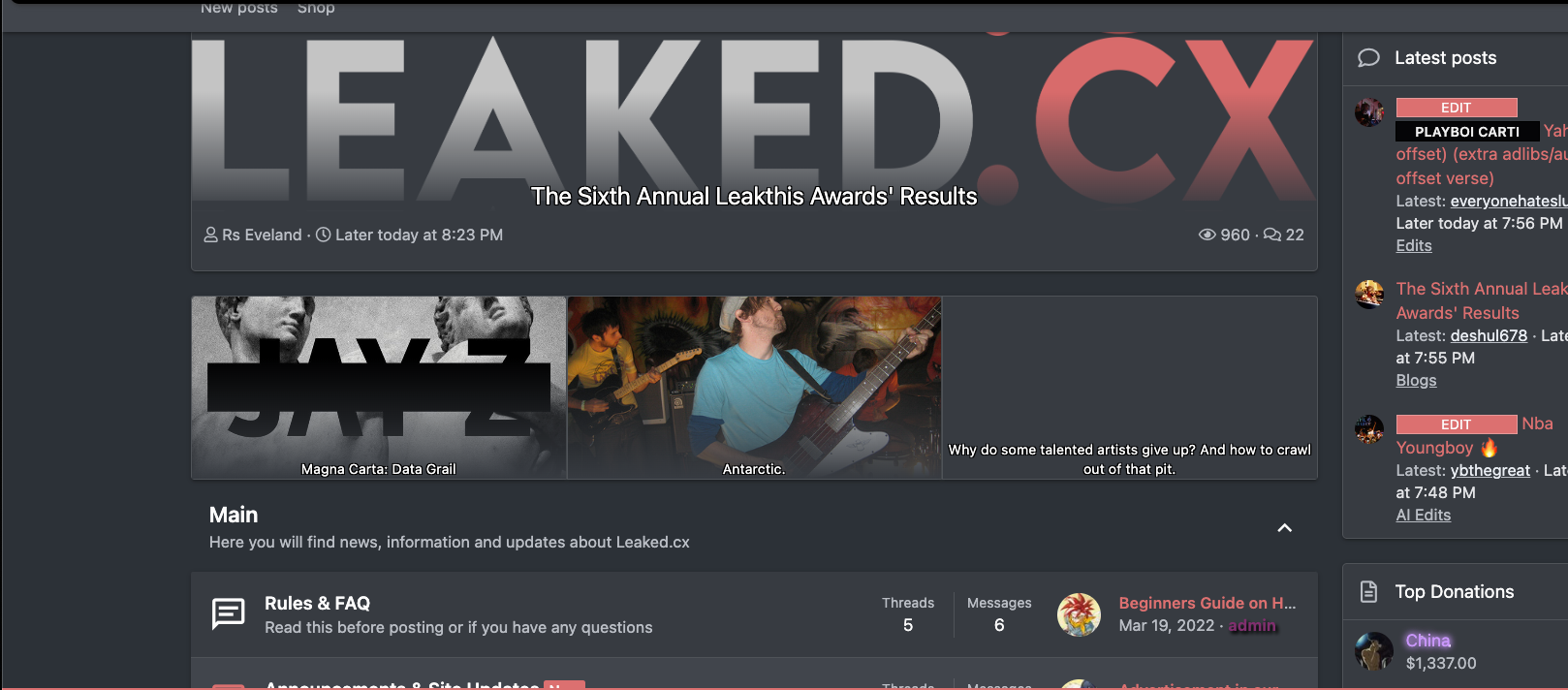
The last cache of Leaked dot cx indexed by the archive.org on Jan. 11, 2024.
And King Bob shared a large number of his purloined tunes with this community. Still others he tried to sell. It’s unclear how many of those sales were ever consummated, but it is not unusual for a prized grail to sell for anywhere from $5,000 to $20,000.
In mid-January 2024, several Leaked[.]cx regulars began complaining that they hadn’t seen King Bob in a while and were really missing his grails. On or around Jan. 11, the same day the Justice Department unsealed the indictment against Urban, Leaked[.]cx started blocking people who were trying to visit the site from the United States.
Days later, frustrated Leaked[.]cx users speculated about what could be the cause of the blockage.
“Probs blocked as part of king bob investigation i think?,” wrote the user “Plsdontarrest.” “Doubt he only hacked US artists/ppl which is why it’s happening in multiple countries.”
On Sept. 21, 2022, KrebsOnSecurity told the story of a “Foreshadow,” the nickname chosen by a Florida teenager who was working for a SIM-swapping crew when he was abducted, beaten and held for a $200,000 ransom. A rival SIM-swapping group claimed that Foreshadow and his associates had robbed them of their fair share of the profits from a recent SIM-swap.
In a video released by his abductors on Telegram, a bloodied, battered Foreshadow was made to say they would kill him unless the ransom was paid.
As I wrote in that story, Foreshadow appears to have served as a “holder” — a term used to describe a low-level member of any SIM-swapping group who agrees to carry out the riskiest and least rewarding role of the crime: Physically keeping and managing the various mobile devices and SIM cards that are used in SIM-swapping scams.
KrebsOnSecurity has since learned that Foreshadow was a holder for a particularly active SIM-swapper who went by “Elijah,” which was another nickname that prosecutors say Urban used.

Shortly after Foreshadow’s hostage video began circulating on Telegram and Discord, multiple known actors in the SIM-swapping space told everyone in the channels to delete any previous messages with Foreshadow, claiming he was fully cooperating with the FBI.
This was not the first time Sosa and his crew were hit with violent attacks from rival SIM-swapping groups. In early 2022, a video surfaced on a popular cybercrime channel purporting to show attackers hurling a brick through a window at an address that matches the spacious and upscale home of Urban’s parents in Sanford, Fl.
“Brickings” are among the “violence-as-a-service” offerings broadly available on many cybercrime channels. SIM-swapping and adjacent cybercrime channels are replete with job offers for in-person assignments and tasks that can be found if one searches for posts titled, “If you live near,” or “IRL job” — short for “in real life” job.
A number of these classified ads are in service of performing brickings, where someone is hired to visit a specific address and toss a brick through the target’s window. Other typical IRL job offers involve tire slashings and even drive-by shootings.
Sosa was known to be a top member of the broader cybercriminal community online known as “The Com,” wherein hackers boast loudly about high-profile exploits and hacks that almost invariably begin with social engineering — tricking people over the phone, email or SMS into giving away credentials that allow remote access to corporate internal networks.
Sosa also was active in a particularly destructive group of accomplished criminal SIM-swappers known as “Star Fraud.” Cyberscoop’s AJ Vicens reported last year that individuals within Star Fraud were likely involved in the high-profile Caesars Entertainment an MGM Resorts extortion attacks.
“ALPHV, an established ransomware-as-a-service operation thought to be based in Russia and linked to attacks on dozens of entities, claimed responsibility for Caesars and MGM attacks in a note posted to its website earlier this month,” Vicens wrote. “Experts had said the attacks were the work of a group tracked variously as UNC 3944 or Scattered Spider, which has been described as an affiliate working with ALPHV made up of people in the United States and Britain who excel at social engineering.”
In February 2023, KrebsOnSecurity published data taken from the Telegram channels for Star Fraud and two other SIM-swapping groups showing these crooks focused on SIM-swapping T-Mobile customers, and that they collectively claimed access to T-Mobile on 100 separate occasions over a 7-month period in 2022.
The SIM-swapping groups were able to switch targeted phone numbers to another device on demand because they constantly phished T-Mobile employees into giving up credentials to employee-only tools. In each of those cases the goal was the same: Phish T-Mobile employees for access to internal company tools, and then convert that access into a cybercrime service that could be hired to divert any T-Mobile user’s text messages and phone calls to another device.
Allison Nixon, chief research officer at the New York cybersecurity consultancy Unit 221B, said the increasing brazenness of many Com members is a function of how long it has taken federal authorities to go after guys like Sosa.
“These incidents show what happens when it takes too long for cybercriminals to get arrested,” Nixon said. “If governments fail to prioritize this source of threat, violence originating from the Internet will affect regular people.”
The Daytona Beach News-Journal reports that Urban was arrested Jan. 9 and his trial is scheduled to begin in the trial term starting March 4 in Jacksonville. The publication said the judge overseeing Urban’s case denied bail because the defendant was a strong flight risk.
At Urban’s arraignment, it emerged that he had no fixed address and had been using an alias to stay at an Airbnb. The judge reportedly said that when a search warrant was executed at Urban’s residence, the defendant was downloading programs to delete computer files.
What’s more, the judge explained, despite telling authorities in May that he would not have any more contact with his co-conspirators and would not engage in cryptocurrency transactions, he did so anyway.
Urban entered a plea of not guilty. Urban’s court-appointed attorney said her client would have no comment at this time.
Prosecutors charged Urban with eight counts of wire fraud, one count of conspiracy to commit wire fraud, and five counts of aggravated identity theft. According to the government, if convicted Urban faces up to 20 years in federal prison on each wire fraud charge. He also faces a minimum mandatory penalty of two years in prison for the aggravated identity offenses, which will run consecutive to any other prison sentence imposed.
Authorities in Australia, the United Kingdom and the United States this week levied financial sanctions against a Russian man accused of stealing data on nearly 10 million customers of the Australian health insurance giant Medibank. 33-year-old Aleksandr Ermakov allegedly stole and leaked the Medibank data while working with one of Russia’s most destructive ransomware groups, but little more is shared about the accused. Here’s a closer look at the activities of Mr. Ermakov’s alleged hacker handles.

Aleksandr Ermakov, 33, of Russia. Image: Australian Department of Foreign Affairs and Trade.
The allegations against Ermakov mark the first time Australia has sanctioned a cybercriminal. The documents released by the Australian government included multiple photos of Mr. Ermakov, and it was clear they wanted to send a message that this was personal.
It’s not hard to see why. The attackers who broke into Medibank in October 2022 stole 9.7 million records on current and former Medibank customers. When the company refused to pay a $10 million ransom demand, the hackers selectively leaked highly sensitive health records, including those tied to abortions, HIV and alcohol abuse.
The U.S. government says Ermakov and the other actors behind the Medibank hack are believed to be linked to the Russia-backed cybercrime gang REvil.
“REvil was among the most notorious cybercrime gangs in the world until July 2021 when they disappeared. REvil is a ransomware-as-a-service (RaaS) operation and generally motivated by financial gain,” a statement from the U.S. Department of the Treasury reads. “REvil ransomware has been deployed on approximately 175,000 computers worldwide, with at least $200 million paid in ransom.”
The sanctions say Ermakov went by multiple aliases on Russian cybercrime forums, including GustaveDore, JimJones, and Blade Runner. A search on the handle GustaveDore at the cyber intelligence platform Intel 471 shows this user created a ransomware affiliate program in November 2021 called Sugar (a.k.a. Encoded01), which focused on targeting single computers and end-users instead of corporations.
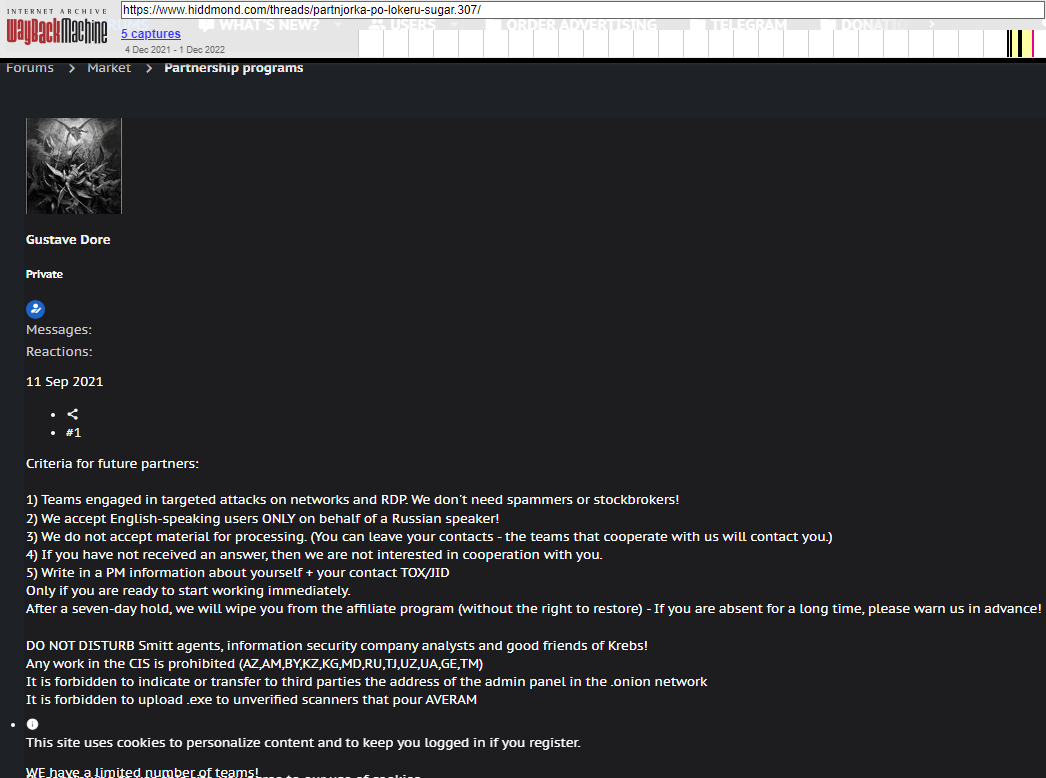
An ad for the ransomware-as-a-service program Sugar posted by GustaveDore warns readers against sharing information with security researchers, law enforcement, or “friends of Krebs.”
In November 2020, Intel 471 analysts concluded that GustaveDore’s alias JimJones “was using and operating several different ransomware strains, including a private undisclosed strain and one developed by the REvil gang.”
In 2020, GustaveDore advertised on several Russian discussion forums that he was part of a Russian technology firm called Shtazi, which could be hired for computer programming, web development, and “reputation management.” Shtazi’s website remains in operation today.

A Google-translated version of Shtazi dot ru. Image: Archive.org.
The third result when one searches for shtazi[.]ru in Google is an Instagram post from a user named Mikhail Borisovich Shefel, who promotes Shtazi’s services as if it were also his business. If this name sounds familiar, it’s because in December 2023 KrebsOnSecurity identified Mr. Shefel as “Rescator,” the cybercriminal identity tied to tens of millions of payment cards that were stolen in 2013 and 2014 from big box retailers Target and Home Depot, among others.
How close was the connection between GustaveDore and Mr. Shefel? The Treasury Department’s sanctions page says Ermakov used the email address ae.ermak@yandex.ru. A search for this email at DomainTools.com shows it was used to register just one domain name: millioner1[.]com. DomainTools further finds that a phone number tied to Mr. Shefel (79856696666) was used to register two domains: millioner[.]pw, and shtazi[.]net.
The December 2023 story here that outed Mr. Shefel as Rescator noted that Shefel recently changed his last name to “Lenin” and had launched a service called Lenin[.]biz that sells physical USSR-era Ruble notes bearing the image of Vladimir Lenin, the founding father of the Soviet Union. The Instagram account for Mr. Shefel includes images of stacked USSR-era Ruble notes, as well as multiple links to Shtazi.

The Instagram account of Mikhail Borisovich Shefel, aka MikeMike aka Rescator.
Intel 471’s research revealed Ermakov was affiliated in some way with REvil because the stolen Medibank data was published on a blog that had one time been controlled by REvil affiliates who carried out attacks and paid an affiliate fee to the gang.
But by the time of the Medibank hack, the REvil group had mostly scattered after a series of high-profile attacks led to the group being disrupted by law enforcement. In November 2021, Europol announced it arrested seven REvil affiliates who collectively made more than $230 million worth of ransom demands since 2019. At the same time, U.S. authorities unsealed two indictments against a pair of accused REvil cybercriminals.
“The posting of Medibank’s data on that blog, however, indicated a connection with that group, although the connection wasn’t clear at the time,” Intel 471 wrote. “This makes sense in retrospect, as Ermakov’s group had also been a REvil affiliate.”
It is easy to dismiss sanctions like these as ineffective, because as long as Mr. Ermakov remains in Russia he has little to fear of arrest. However, his alleged role as an apparent top member of REvil paints a target on him as someone who likely possesses large sums of cryptocurrency, said Patrick Gray, the Australian co-host and founder of the security news podcast Risky Business.
“I’ve seen a few people poo-poohing the sanctions…but the sanctions component is actually less important than the doxing component,” Gray said. “Because this guy’s life just got a lot more complicated. He’s probably going to have to pay some bribes to stay out of trouble. Every single criminal in Russia now knows he is a vulnerable 33 year old with an absolute ton of bitcoin. So this is not a happy time for him.”
Update, Feb. 21, 1:10 p.m. ET: The Russian security firm F.A.C.C.T reports that Ermakov has been arrested in Russia, and charged with violating domestic laws that prohibit the creation, use and distribution of malicious computer programs.
“During the investigation, several defendants were identified who were not only promoting their ransomware, but also developing custom-made malicious software, creating phishing sites for online stores, and driving user traffic to fraudulent schemes popular in Russia and the CIS,” F.A.C.C.T. wrote. “Among those detained was the owner of the nicknames blade_runner, GistaveDore, GustaveDore, JimJones.”
Google continues to struggle with cybercriminals running malicious ads on its search platform to trick people into downloading booby-trapped copies of popular free software applications. The malicious ads, which appear above organic search results and often precede links to legitimate sources of the same software, can make searching for software on Google a dicey affair.
Google says keeping users safe is a top priority, and that the company has a team of thousands working around the clock to create and enforce their abuse policies. And by most accounts, the threat from bad ads leading to backdoored software has subsided significantly compared to a year ago.
But cybercrooks are constantly figuring out ingenious ways to fly beneath Google’s anti-abuse radar, and new examples of bad ads leading to malware are still too common.
For example, a Google search earlier this week for the free graphic design program FreeCAD produced the following result, which shows that a “Sponsored” ad at the top of the search results is advertising the software available from freecad-us[.]org. Although this website claims to be the official FreeCAD website, that honor belongs to the result directly below — the legitimate freecad.org.

How do we know freecad-us[.]org is malicious? A review at DomainTools.com show this domain is the newest (registered Jan. 19, 2024) of more than 200 domains at the Internet address 93.190.143[.]252 that are confusingly similar to popular software titles, including dashlane-project[.]com, filezillasoft[.]com, keepermanager[.]com, and libreofficeproject[.]com.
Some of the domains at this Netherlands host appear to be little more than software review websites that steal content from established information sources in the IT world, including Gartner, PCWorld, Slashdot and TechRadar.
Other domains at 93.190.143[.]252 do serve actual software downloads, but none of them are likely to be malicious if one visits the sites through direct navigation. If one visits openai-project[.]org and downloads a copy of the popular Windows desktop management application Rainmeter, for example, the file that is downloaded has the same exact file signature as the real Rainmeter installer available from rainmeter.net.
But this is only a ruse, says Tom Hegel, principal threat researcher at the security firm Sentinel One. Hegel has been tracking these malicious domains for more than a year, and he said the seemingly benign software download sites will periodically turn evil, swapping out legitimate copies of popular software titles with backdoored versions that will allow cybercriminals to remotely commander the systems.
“They’re using automation to pull in fake content, and they’re rotating in and out of hosting malware,” Hegel said, noting that the malicious downloads may only be offered to visitors who come from specific geographic locations, like the United States. “In the malicious ad campaigns we’ve seen tied to this group, they would wait until the domains gain legitimacy on the search engines, and then flip the page for a day or so and then flip back.”
In February 2023, Hegel co-authored a report on this same network, which Sentinel One has dubbed MalVirt (a play on “malvertising”). They concluded that the surge in malicious ads spoofing various software products was directly responsible for a surge in malware infections from infostealer trojans like IcedID, Redline Stealer, Formbook and AuroraStealer.
Hegel noted that the spike in malicious software-themed ads came not long after Microsoft started blocking by default Office macros in documents downloaded from the Internet. He said the volume of the current malicious ad campaigns from this group appears to be relatively low compared to a year ago.
“It appears to be same campaign continuing,” Hegel said. “Last January, every Google search for ‘Autocad’ led to something bad. Now, it’s like they’re paying Google to get one out of every dozen of searches. My guess it’s still continuing because of the up-and-down [of the] domains hosting malware and then looking legitimate.”
Several of the websites at this Netherlands host (93.190.143[.]252) are currently blocked by Google’s Safebrowsing technology, and labeled with a conspicuous red warning saying the website will try to foist malware on visitors who ignore the warning and continue.
But it remains a mystery why Google has not similarly blocked more than 240+ other domains at this same host, or else removed them from its search index entirely. Especially considering there is nothing else but these domains hosted at that Netherlands IP address, and because they have all remained at that address for the past year.
In response to questions from KrebsOnSecurity, Google said maintaining a safe ads ecosystem and keeping malware off of its platforms is a priority across Google.
“Bad actors often employ sophisticated measures to conceal their identities and evade our policies and enforcement, sometimes showing Google one thing and users something else,” Google said in a written statement. “We’ve reviewed the ads in question, removed those that violated our policies, and suspended the associated accounts. We’ll continue to monitor and apply our protections.”
Google says it removed 5.2 billion ads in 2022, and restricted more than 4.3 billion ads and suspended over 6.7 million advertiser accounts. The company’s latest ad safety report says Google in 2022 blocked or removed 1.36 billion advertisements for violating its abuse policies.
Some of the domains referenced in this story were included in Sentinel One’s February 2023 report, but dozens more have been added since, such as those spoofing the official download sites for Corel Draw, Github Desktop, Roboform and Teamviewer.
This October 2023 report on the FreeCAD user forum came from a user who reported downloading a copy of the software from freecadsoft[.]com after seeing the site promoted at the top of a Google search result for “freecad.” Almost a month later, another FreeCAD user reported getting stung by the same scam.
“This got me,” FreeCAD forum user “Matterform” wrote on Nov. 19, 2023. “Please leave a report with Google so it can flag it. They paid Google for sponsored posts.”
Sentinel One’s report didn’t delve into the “who” behind this ongoing MalVirt campaign, and there are precious few clues that point to attribution. All of the domains in question were registered through webnic.cc, and several of them display a placeholder page saying the site is ready for content. Viewing the HTML source of these placeholder pages shows many of the hidden comments in the code are in Cyrillic.
Trying to track the crooks using Google’s Ad Transparency tools didn’t lead far. The ad transparency record for the malicious ad featuring freecad-us[.]org (in the screenshot above) shows that the advertising account used to pay for the ad has only run one previous ad through Google search: It advertised a wedding photography website in New Zealand.
The apparent owner of that photography website did not respond to requests for comment, but it’s also likely his Google advertising account was hacked and used to run these malicious ads.
The rapper and social media personality Punchmade Dev is perhaps best known for his flashy videos singing the praises of a cybercrime lifestyle. With memorable hits such as “Internet Swiping” and “Million Dollar Criminal” earning millions of views, Punchmade has leveraged his considerable following to peddle tutorials on how to commit financial crimes online. But until recently, there wasn’t much to support a conclusion that Punchmade was actually doing the cybercrime things he promotes in his songs.

Images from Punchmade Dev’s Twitter/X account show him displaying bags of cash and wearing a functional diamond-crusted payment card skimmer.
Punchmade Dev’s most controversial mix — a rap called “Wire Fraud Tutorial” — was taken down by Youtube last summer for violating the site’s rules. Punchmade shared on social media that the video’s removal was prompted by YouTube receiving a legal process request from law enforcement officials.
The 24-year-old rapper told reporters he wasn’t instructing people how to conduct wire fraud, but instead informing his fans on how to avoid being victims of wire fraud. However, this is difficult to discern from listening to the song, which sounds very much like a step-by-step tutorial on how to commit wire fraud.
“Listen up, I’m finna show y’all how to hit a bank,” Wire Fraud Tutorial begins. “Just pay attention, this is a quick way to jug in any state. First you wanna get a bank log from a trusted site. Do your research because the information must be right.”
And even though we’re talking about an individual who regularly appears in videos wearing a half-million dollars worth of custom jewelry draped around his arm and neck (including the functional diamond-encrusted payment card skimming device pictured above), there’s never been much evidence that Punchmade was actually involved in committing cybercrimes himself. Even his most vocal critics acknowledged that the whole persona could just be savvy marketing.
That changed recently when Punchmade’s various video and social media accounts began promoting a new web shop that is selling stolen payment cards and identity data, as well as hacked financial accounts and software for producing counterfeit checks.

Punchmade Dev’s shop.
The official Punchmadedev account on Instagram links to many of the aforementioned rap videos and tutorials on cybercriming, as well as to Punchmadedev’s other profiles and websites. Among them is mainpage[.]me/punchmade, which includes the following information for “Punchmade Empire ®”
-212,961 subscribers
#1 source on Telegram
Contact: @whopunchmade
24/7 shop: https://punchmade[.]atshop[.]io
Visiting that @whopunchmade Telegram channel shows this user is promoting punchmade[.]atshop[.]io, which is currently selling hacked bank accounts and payment cards with high balances.

Clicking “purchase” on the C@sh App offering, for example, shows that for $80 the buyer will receive logins to Cash App accounts with balances between $3,000 and $5,000. “If you buy this item you’ll get my full support on discord/telegram if there is a problem!,” the site promises. Purchases can be made in cryptocurrencies, and checking out prompts one to continue payment at Coinbase.com.
Another item for sale, “Fullz + Linkable CC,” promises “ID Front + Back, SSN with 700+ Credit Score, and Linkable CC” or credit card. That also can be had for $80 in crypto.
Punchmade has fashioned his public persona around a collection of custom-made, diamond-covered necklaces that are as outlandish and gaudy as they are revelatory. My favorite shot from one of Punchmade’s videos features at least three of these monstrosities: One appears to be a boring old diamond and gold covered bitcoin, but the other two necklaces tell us something about where Punchmade is from:

Notice the University of Kentucky logo, and the Lexington, Ky skyline.
One of them includes the logo and mascot of the University of Kentucky. The other, an enormous diamond studded skyline, appears to have been designed based on the skyline in Lexington, Ky:

The “About” page on Punchmade Dev’s Spotify profile describes him as “an American artist, rapper, musician, producer, director, entrepreneur, actor and investor.” “Punchmade Dev is best known for his creative ways to use technology, video gaming, and social media to build a fan base,” the profile continues.
The profile explains that he launched his own record label in 2021 called Punchmade Records, where he produces his own instrumentals and edits his own music videos.
A search on companies that include the name “punchmade” at the website of the Kentucky Secretary of State brings up just one record: OBN Group LLC, in Lexington, Ky. This November 2021 record includes a Certificate of Assumed Name, which shows that Punchmade LLC is the assumed name of OBN Group LLC.
The president of OBN Group LLC is listed as Devon Turner. A search on the Secretary of State website for other businesses tied to Devon Turner reveals just one other record: A now-defunct entity called DevTakeFlightBeats Inc.
The breach tracking service Constella Intelligence finds that Devon Turner from Lexington, Ky. used the email address obndevpayments@gmail.com. A lookup on this email at DomainTools.com shows it was used to register the domain foreverpunchmade[.]com, which is registered to a Devon Turner in Lexington, Ky. A copy of this site at archive.org indicates it once sold Punchmade Dev-branded t-shirts and other merchandise.
Mr. Turner did not respond to multiple requests for comment.
Searching online for Devon Turner and “Punchmade” brings up a video from @brainjuiceofficial, a YouTube channel that focuses on social media celebrities. @Brainjuiceofficial says Turner was born in October 2000, the oldest child of a single mother of five whose husband was not in the picture.

Devon Turner, a.k.a. “Punchmade Dev,” in an undated photo.
The video says the six-foot five Turner played basketball, track and football in high school, but that he gradually became obsessed with playing the video game NBA 2K17 and building a following of people watching him play the game competitively online.
According to this brief documentary, Turner previously streamed his NBA 2K17 videos on a YouTube channel called DevTakeFlight, although he originally went by the nickname OBN Dev.
“Things may eventually catch up to Devon if he isn’t careful,” @Brainjuiceofficial observed, noting that Turner has been shot at before, and also robbed at an ATM while flexing a bunch of cash for a picture and wearing $500k in jewelry. “Although you have a lot of people that are into what you do, there are a lot of people waiting for you to slip up.”
In 2020, the United States brought charges against four men accused of building a bulletproof hosting empire that once dominated the Russian cybercrime industry and supported multiple organized cybercrime groups. All four pleaded guilty to conspiracy and racketeering charges. But there is a fascinating and untold backstory behind the two Russian men involved, who co-ran the world’s top spam forum and worked closely with Russia’s most dangerous cybercriminals.
From January 2005 to April 2013, there were two primary administrators of the cybercrime forum Spamdot (a.k.a Spamit), an invite-only community for Russian-speaking people in the businesses of sending spam and building botnets of infected computers to relay said spam. The Spamdot admins went by the nicknames Icamis (a.k.a. Ika), and Salomon (a.k.a. Sal).
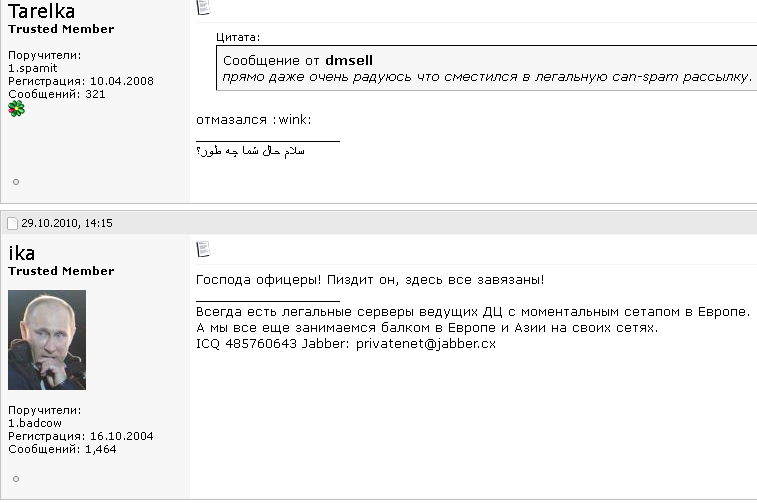
Spamdot forum administrator “Ika” a.k.a. “Icamis” responds to a message from “Tarelka,” the botmaster behind the Rustock botnet. Dmsell said: “I’m actually very glad that I switched to legal spam mailing,” prompting Tarelka and Ika to scoff.
As detailed in my 2014 book, Spam Nation, Spamdot was home to crooks controlling some of the world’s nastiest botnets, global malware contagions that went by exotic names like Rustock, Cutwail, Mega-D, Festi, Waledac, and Grum.
Icamis and Sal were in daily communications with these botmasters, via the Spamdot forum and private messages. Collectively in control over millions of spam-spewing zombies, those botmasters also continuously harvested passwords and other data from infected machines.
As we’ll see in a moment, Salomon is now behind bars, in part because he helped to rob dozens of small businesses in the United States using some of those same harvested passwords. He is currently housed in a federal prison in Michigan, serving the final stretch of a 60-month sentence.
But the identity and whereabouts of Icamis have remained a mystery to this author until recently. For years, security experts — and indeed, many top cybercriminals in the Spamit affiliate program — have expressed the belief that Sal and Icamis were likely the same person using two different identities. And there were many good reasons to support this conclusion.
For example, in 2010 Spamdot and its spam affiliate program Spamit were hacked, and its user database shows Sal and Icamis often accessed the forum from the same Internet address — usually from Cherepovets, an industrial town situated approximately 230 miles north of Moscow. Also, it was common for Icamis to reply when Spamdot members communicated a request or complaint to Sal, and vice versa.

Image: maps.google.com
Still, other clues suggested Icamis and Sal were two separate individuals. For starters, they frequently changed the status on their instant messenger clients at different times. Also, they each privately discussed with others having attended different universities.
KrebsOnSecurity began researching Icamis’s real-life identity in 2012, but failed to revisit any of that research until recently. In December 2023, KrebsOnSecurity published new details about the identity of “Rescator,” a Russian cybercriminal who is thought to be closely connected to the 2013 data breach at Target.
That story mentioned Rescator’s real-life identity was exposed by Icamis in April 2013, as part of a lengthy farewell letter Ika wrote to Spamdot members wherein Ika said he was closing the forum and quitting the cybercrime business entirely.
To no one’s shock, Icamis didn’t quit the business: He simply became more quiet and circumspect about his work, which increasingly was focused on helping crime groups siphon funds from U.S. bank accounts. But the Rescator story was a reminder that 10 years worth of research on who Ika/Icamis is in real life had been completely set aside. This post is an attempt to remedy that omission.
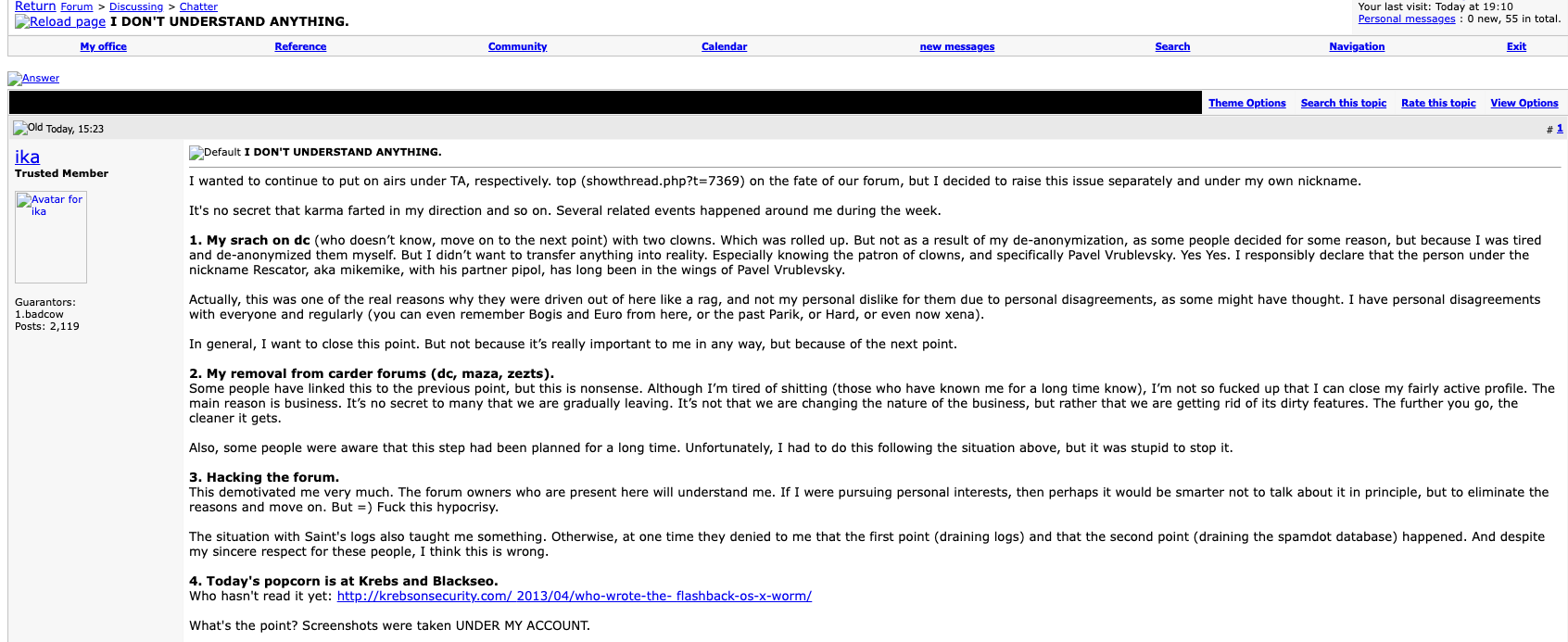
The farewell post from Ika (aka Icamis), the administrator of both the BlackSEO forum and Pustota, the successor forum to Spamit/Spamdot.
Icamis and Sal offered a comprehensive package of goods and services that any aspiring or accomplished spammer would need on a day-to-day basis: Virtually unlimited bulletproof domain registration and hosting services, as well as services that helped botmasters evade spam block lists generated by anti-spam groups like Spamhaus.org. Here’s snippet of Icamis’s ad on Spamdot from Aug. 2008, wherein he addresses forum members with the salutation, “Hello Gentlemen Scammers.”
We are glad to present you our services!
Many are already aware (and are our clients), but publicity is never superfluous.Domains.
– all major gtlds (com, net, org, info, biz)
– many interesting and uninteresting cctlds
– options for any topic
– processing of any quantities
– guarantees
– exceptionally low prices for domains for white and gray schemes (including any SEO and affiliate spam )
– control panel with balances and auto-registration
– all services under the Ikamis brand, proven over the years;)Servers.
– long-term partnerships with several [data centers] in several parts of the world for any topic
– your own data center (no longer in Russia ;)) for gray and white topics
– any configuration and any hardware
– your own IP networks (PI, not PA) and full legal support
– realtime backups to neutral sites
– guarantees and full responsibility for the services provided
– non-standard equipment on request
– our own admins to resolve any technical issues (services are free for clients)
– hosting (shared and vps) is also possibleNon-standard and related services.
– ssl certificates signed by geotrust and thawte
– old domains (any year, any quantity)
– beautiful domains (keyword, short, etc.)
– domains with indicators (any, for SEO, etc.)
– making unstable gtld domains stable
– interception and hijacking of custom domains (expensive)
– full domain posting via web.archive.org with restoration of native content (preliminary applications)
– any updates to our panels to suit your needs upon request (our own coders)All orders for the “Domains” sections and “Servers” are carried out during the day (depending on our workload).
For non-standard and related services, a preliminary application is required 30 days in advance (except for ssl certificates – within 24 hours).
Icamis and Sal frequently claimed that their service kept Spamhaus and other anti-spam groups several steps behind their operations. But it’s clear that those anti-spam operations had a real and painful impact on spam revenues, and Salomon was obsessed with striking back at anti-spam groups, particularly Spamhaus.
In 2007, Salomon collected more than $3,000 from botmasters affiliated with competing spam affiliate programs that wanted to see Spamhaus suffer, and the money was used to fund a week-long distributed denial-of-service (DDoS) attack against Spamhaus and its online infrastructure. But rather than divert their spam botnets from their normal activity and thereby decrease sales, the botmasters voted to create a new DDoS botnet by purchasing installations of DDoS malware on thousands of already-hacked PCs (at a rate of $25 per 1,000 installs).
As an affiliate of Spamdot, Salomon used the email address ad1@safe-mail.net, and the password 19871987gr. The breach tracking service Constella Intelligence found the password 19871987gr was used by the email address grichishkin@gmail.com. Multiple accounts are registered to that email address under the name Alexander Valerievich Grichishkin, from Cherepovets.
In 2020, Grichishkin was arrested outside of Russia on a warrant for providing bulletproof hosting services to cybercriminal gangs. The U.S. government said Grichishkin and three others set up the infrastructure used by cybercriminals between 2009 to 2015 to distribute malware and attack financial institutions and victims throughout the United States.
Those clients included crooks using malware like Zeus, SpyEye, Citadel and the Blackhole exploit kit to build botnets and steal banking credentials.
“The Organization and its members helped their clients to access computers without authorization, steal financial information (including banking credentials), and initiate unauthorized wire transfers from victims’ financial accounts,” the government’s complaint stated.
Grichishkin pleaded guilty to conspiracy charges and was sentenced to four years in prison. He is 36 years old, has a wife and kids in Thailand, and is slated for release on February 8, 2024.
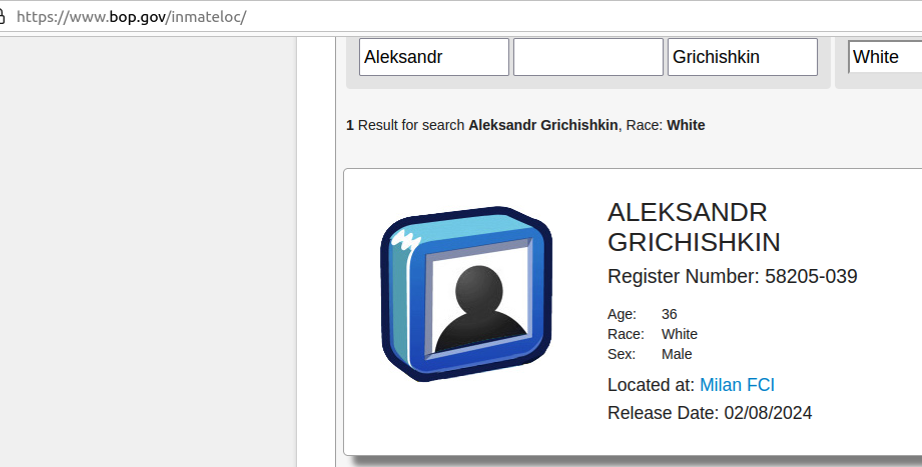
The identity of Icamis came into view when KrebsOnSecurity began focusing on clues that might connect Icamis to Cherepovets (Ika’s apparent hometown based on the Internet addresses he regularly used to access Spamdot).
Historic domain ownership records from DomainTools.com reveal that many of the email addresses and domains connected to Icamis invoke the name “Andrew Artz,” including icamis[.]ws, icamis[.]ru, and icamis[.]biz. Icamis promoted his services in 2003 — such as bulk-domains[.]info — using the email address icamis@4host.info. From one of his ads in 2005:
Domains For Projects Advertised By Spam
I can register bulletproof domains for sites and projects advertised by spam(of course they must be legal). I can not provide DNS for u, only domains. The price will be:
65$ for domain[if u will buy less than 5 domains]
50$ for domain[more than 5 domains]
45$ for domain[more than 10 domains]
These prices are for domains in the .net & .com zones.
If u want to order domains write me to: icamis@4host.info
In 2009, an “Andrew Artz” registered at the hosting service FirstVDS.com using the email address icamis@4host.info, with a notation saying the company name attached to the account was “WMPay.” Likewise, the bulletproof domain service icamis[.]ws was registered to an Andrew Artz.
The domain wmpay.ru is registered to the phonetically similar name “Andrew Hertz,” at andrew@wmpay.ru. A search on “icamis.ru” in Google brings up a 2003 post by him on a discussion forum designed by and for students of Amtek, a secondary school in Cherepovets (Icamis was commenting from an Internet address in Cherepovets).

The website amtek-foreva-narod.ru is still online, and it links to several yearbooks for Amtek graduates. It states that the yearbook for the Amtek class of 2004 is hosted at 41.wmpay[.]com.
The yearbook photos for the Amtek class of 2004 are not indexed in the Wayback Machine at archive.org, but the names and nicknames of 16 students remain. However, it appears that the entry for one student — the Wmpay[.]com site administrator — was removed at some point.
In 2004, the administrator of the Amtek discussion forum — a 2003 graduate who used the handle “Grand” — observed that there were three people named Andrey who graduated from Amtek in 2004, but one of them was conspicuously absent from the yearbook at wmpay[.]ru: Andrey Skvortsov.

To bring this full circle, Icamis was Andrey Skvortsov, the other Russian man charged alongside Grichiskin (the two others who pleaded guilty to conspiracy charges were from Estonia and Lithuania). All of the defendants in that case pleaded guilty to conspiracy to engage in a Racketeer Influenced Corrupt Organization (RICO).
[Author’s note: No doubt government prosecutors had their own reasons for omitting the nicknames of the defendants in their press releases, but that information sure would have saved me a lot of time and effort].
Skvortsov was sentenced to time served, and presumably deported. His current whereabouts are unknown and he was not reachable for comment via his known contact addresses.
The government says Ika and Sal’s bulletproof hosting empire provided extensive support for a highly damaging cybercrime group known as the JabberZeus Crew, which worked closely with the author of the Zeus Trojan — Evgeniy Mikhailovich Bogachev — to develop a then-advanced strain of the Zeus malware that was designed to defeat one-time codes for authentication. Bogachev is a top Russian cybercriminal with a standing $3 million bounty on his head from the FBI.
The JabberZeus Crew stole money by constantly recruiting money mules, people in the United States and in Europe who could be enticed or tricked into forwarding money stolen from cybercrime victims. Interestingly, Icamis’s various email addresses are connected to websites for a vast network of phony technology companies that claimed they needed people with bank accounts to help pay their overseas employees.
Icamis used the email address tech@safe-mail.net on Spamdot, and this email address is tied to the registration records for multiple phony technology companies that were set up to recruit money mules.
One such site — sun-technology[.]net — advertised itself as a Hong Kong-based electronics firm that was looking for “honest, responsible and motivated people in UK, USA, AU and NZ to be Sales Representatives in your particular region and receive payments from our clients. Agent commission is 5 percent of total amount received to the personal bank account. You may use your existing bank account or open a new one for these purposes.”
In January 2010, KrebsOnSecurity broke the news that the JabberZeus crew had just used money mules to steal $500,000 from tiny Duanesburg Central School District in upstate New York. As part of his sentence, Skvortsov was ordered to pay $497,200 in restitution to the Duanesburg Central School District.
The JabberZeus Crew operated mainly out of the eastern Ukraine city of Donetsk, which was always pro-Russia and is now occupied by Russian forces. But when Russia invaded Ukraine in February 2022, the alleged leader of the notorious cybercrime gang — Vyacheslav Igoravich Andreev (a.ka. Penchukov) — fled his mandatory military service orders and was arrested in Geneva, Switzerland. He is currently in federal custody awaiting trial, and is slated to be arraigned in U.S. federal court tomorrow (Jan. 9, 2024). A copy of the indictment against Andreev is here (PDF).

Andreev, aka “Tank,” seen here performing as a DJ in Ukraine in an undated photo from social media.